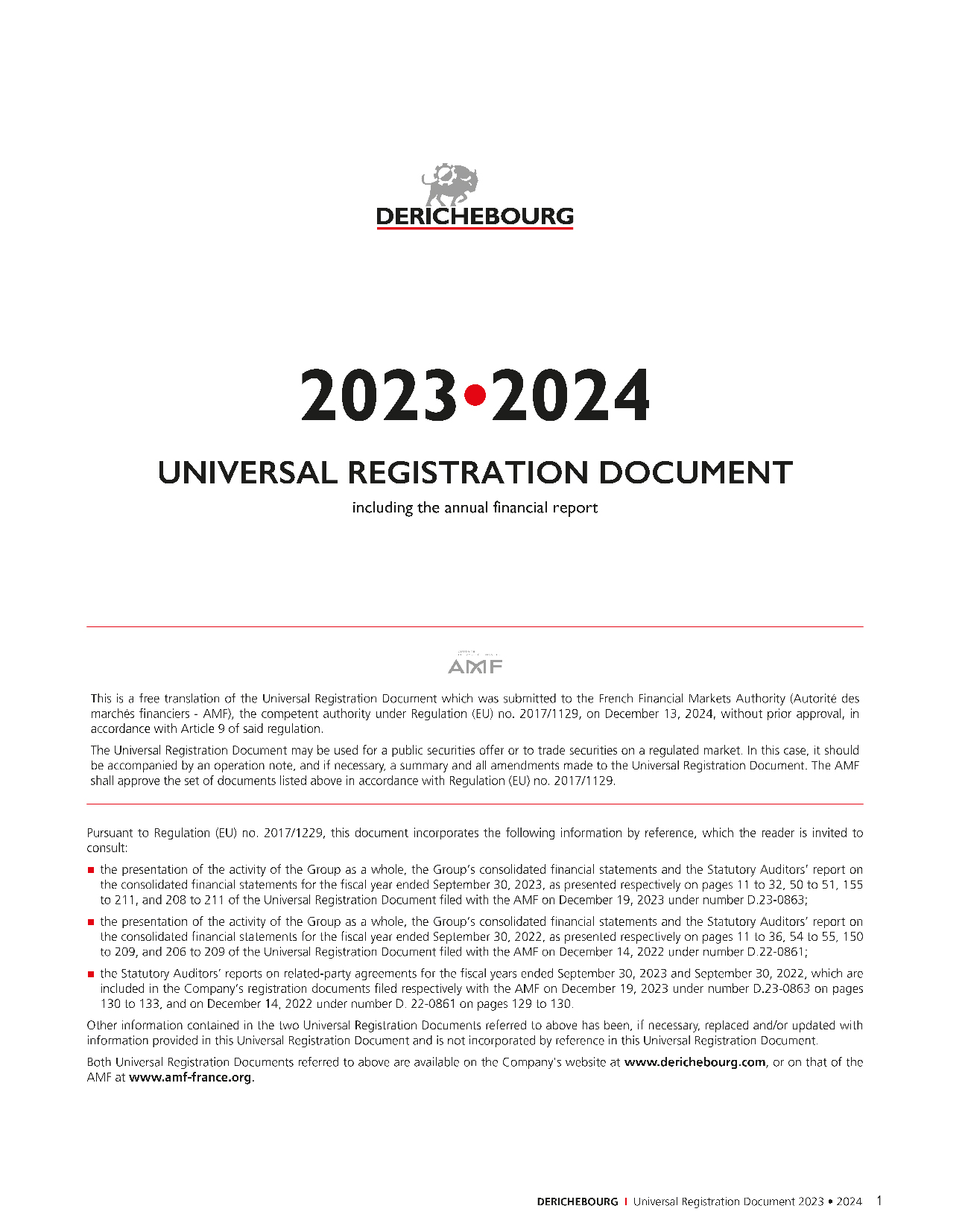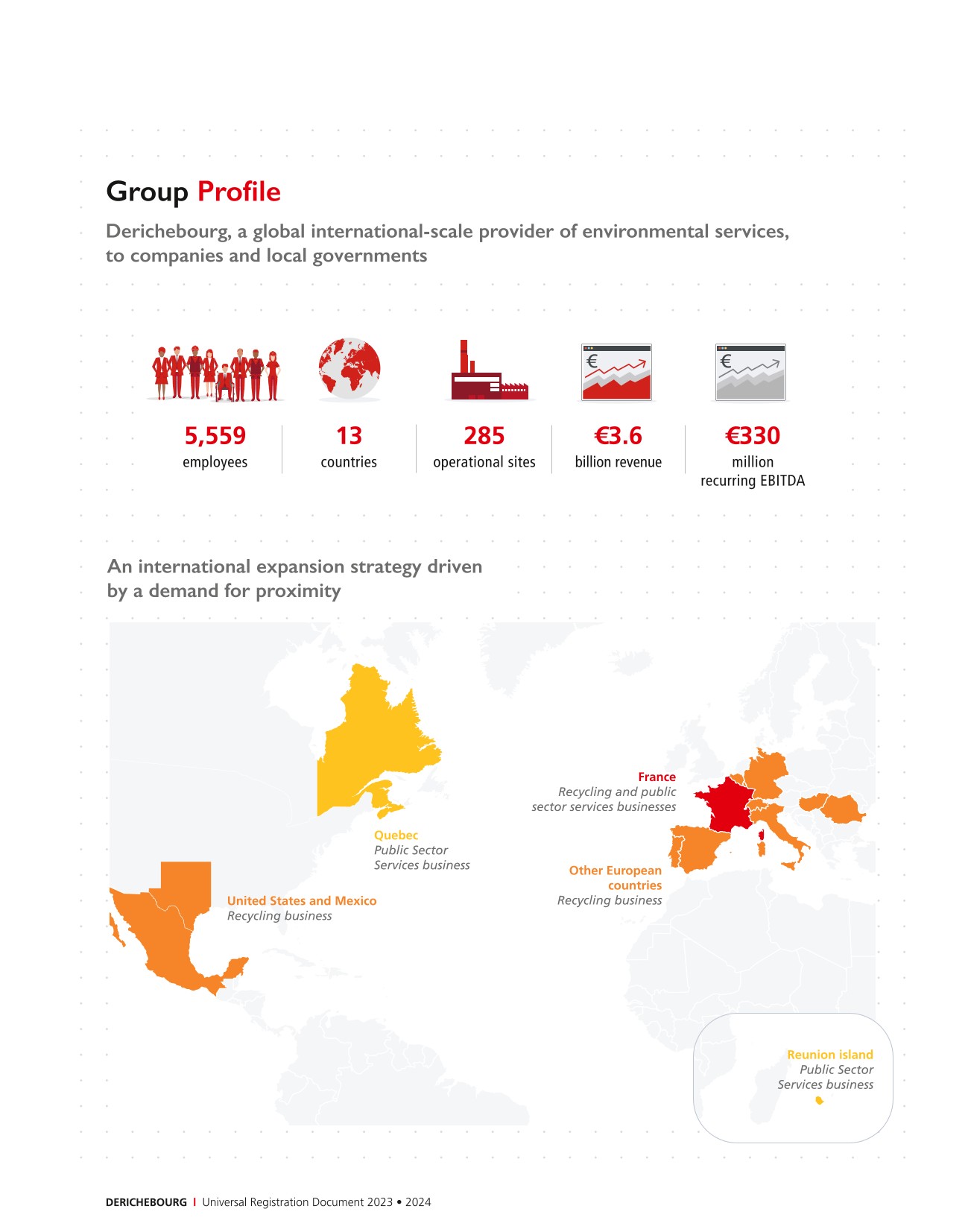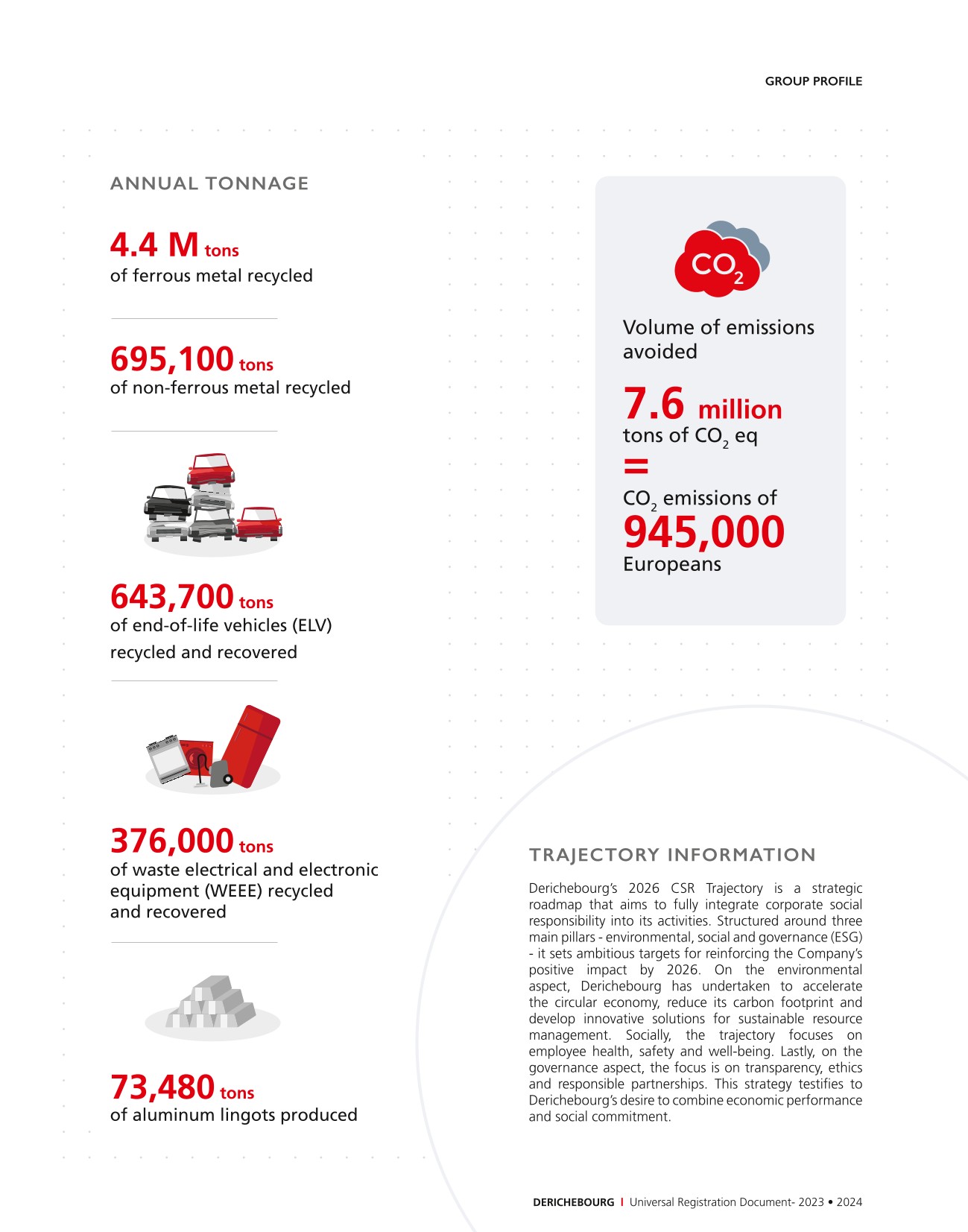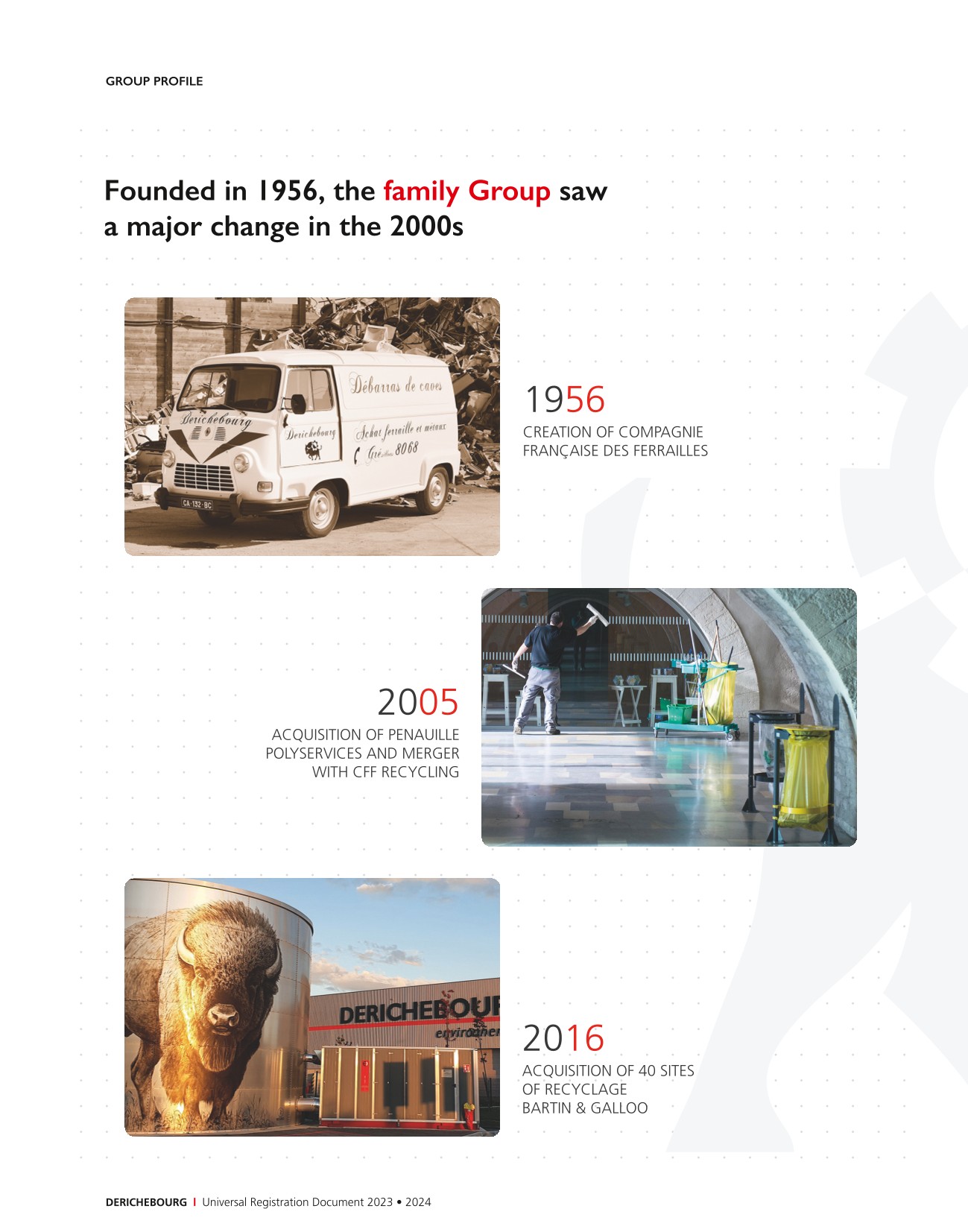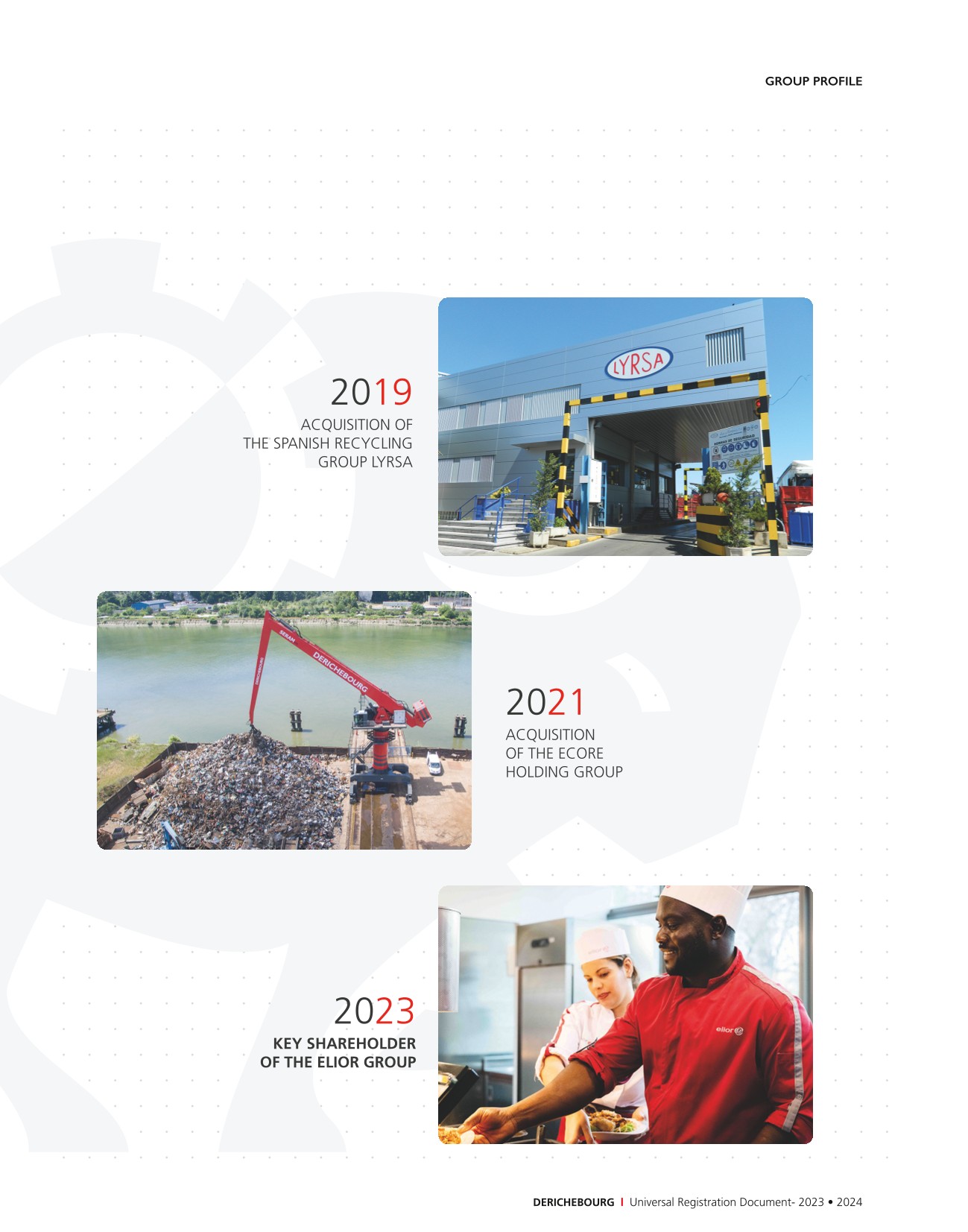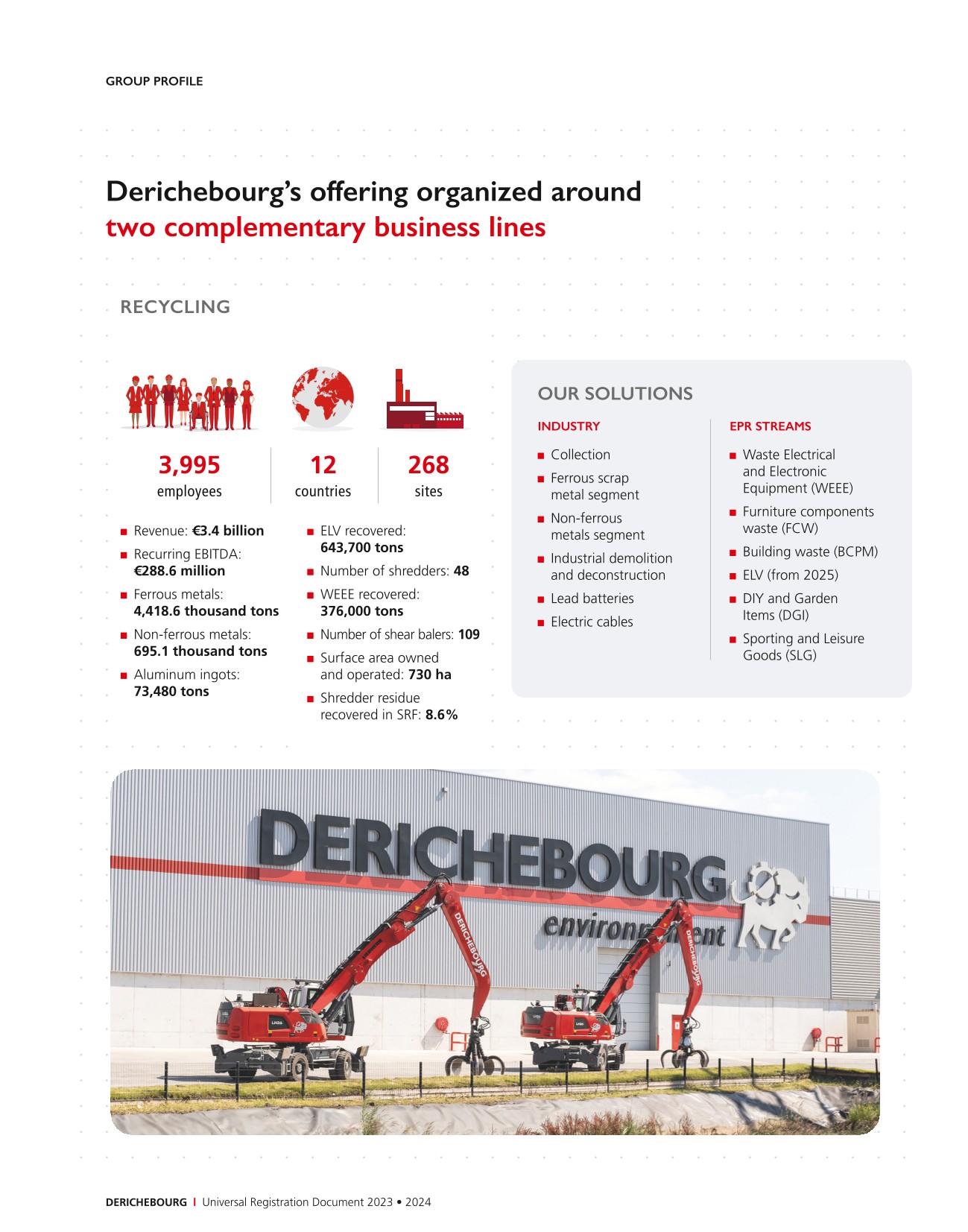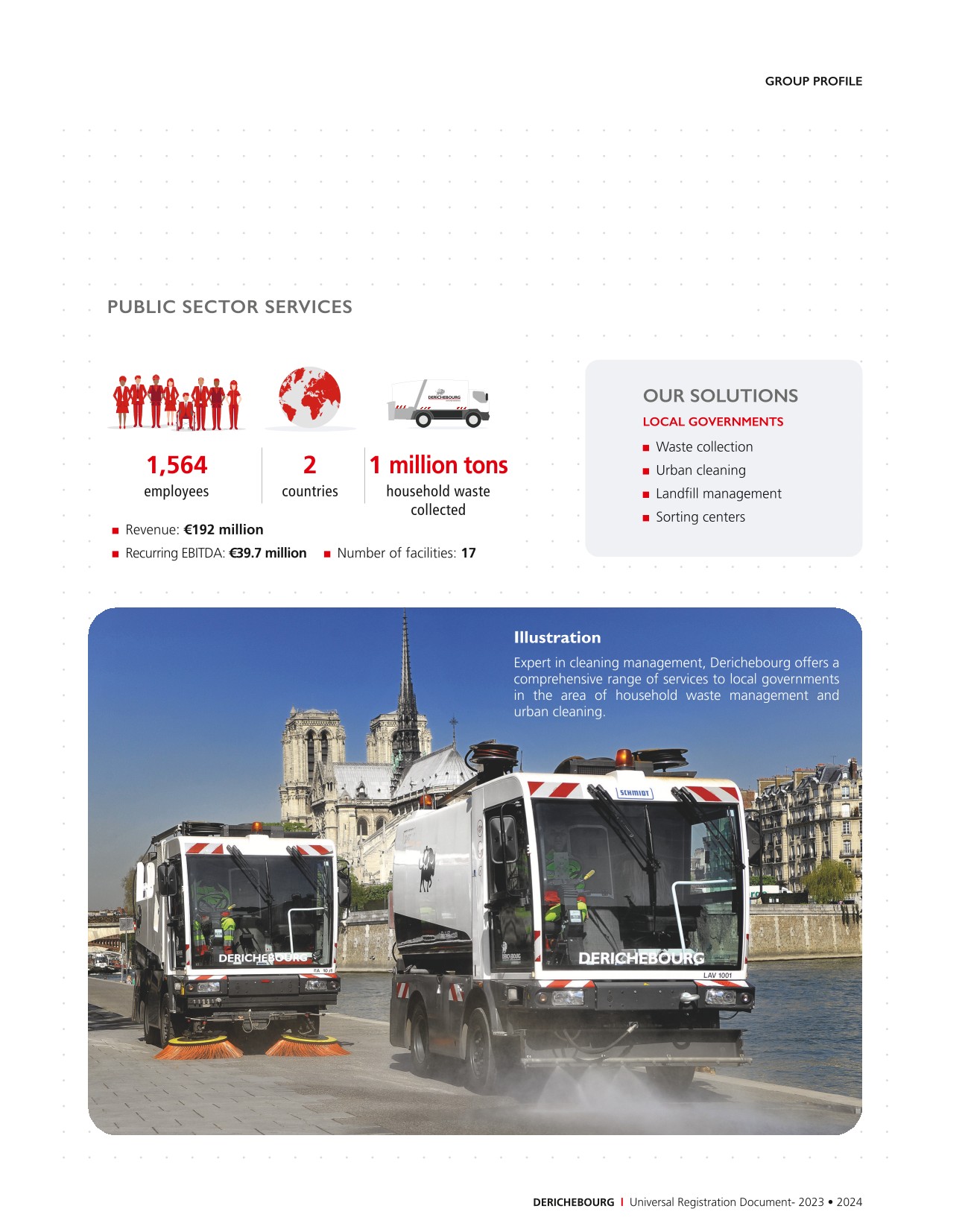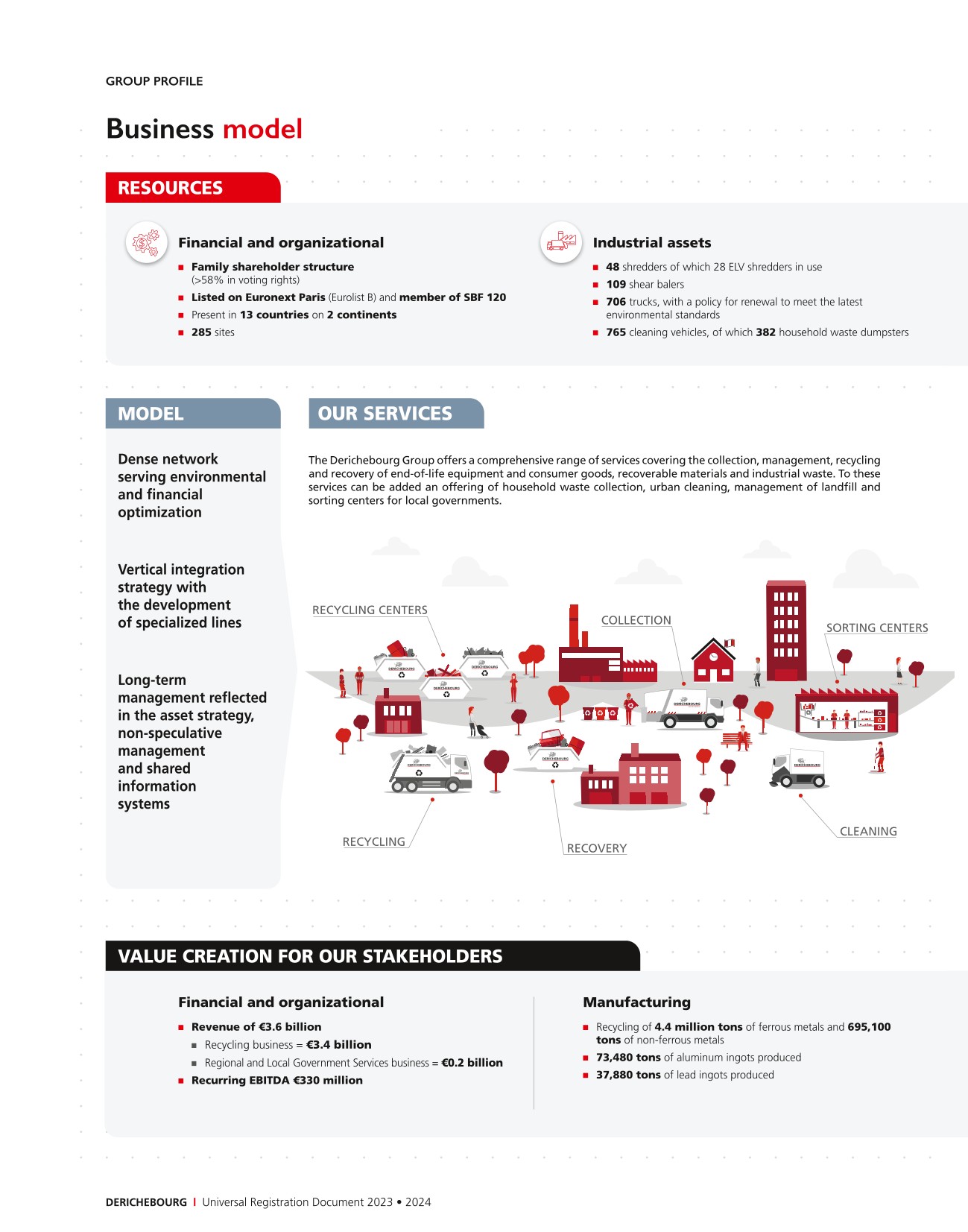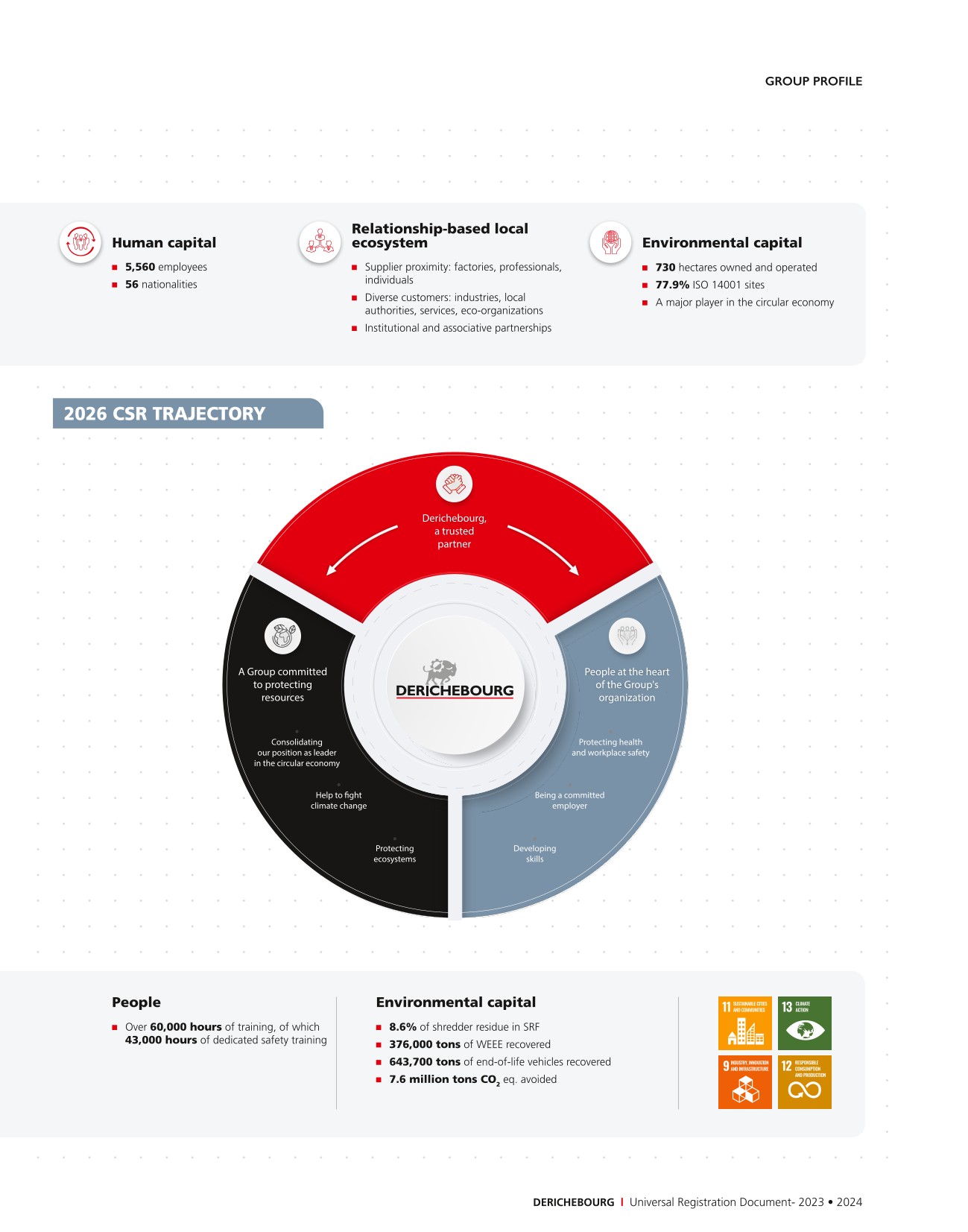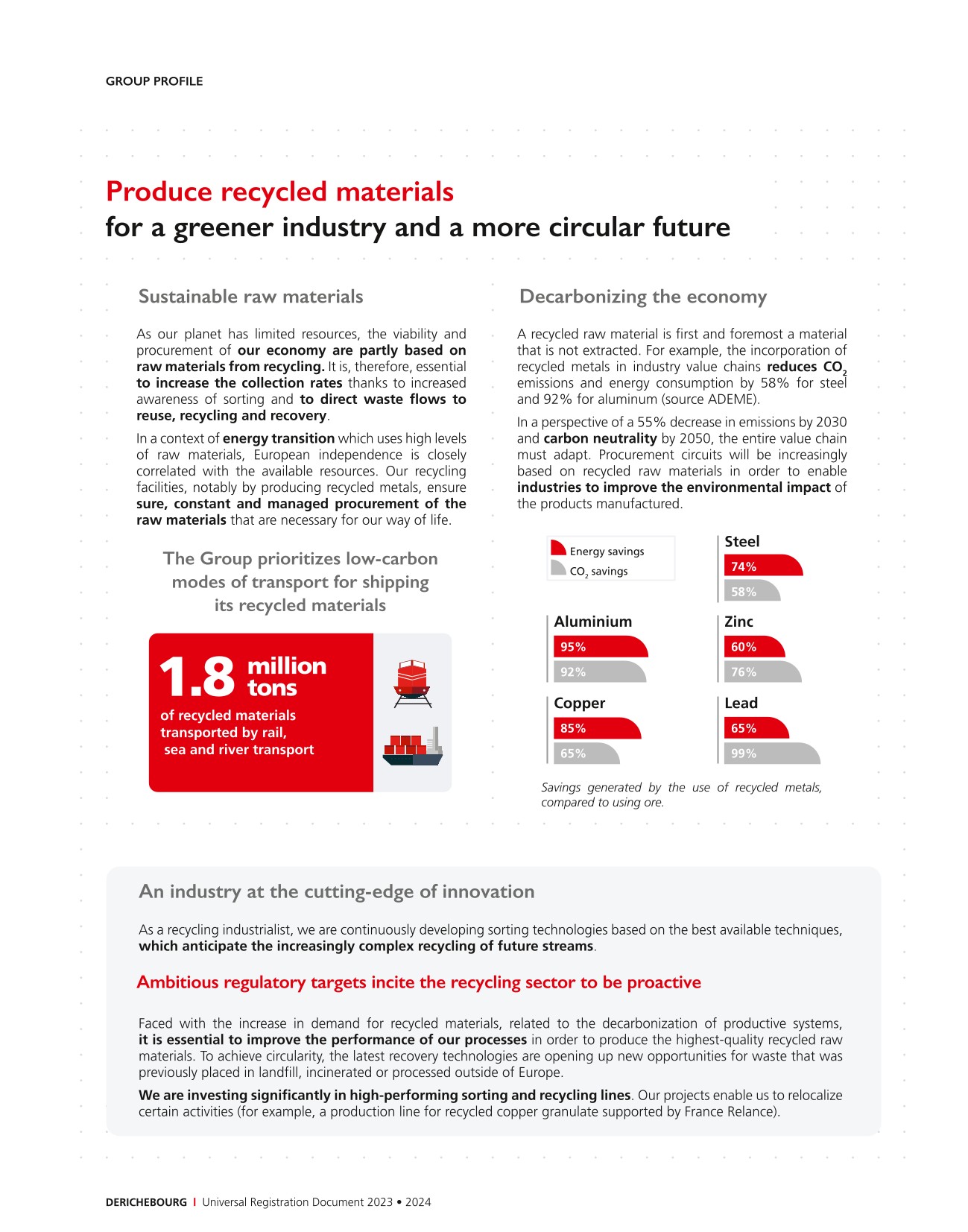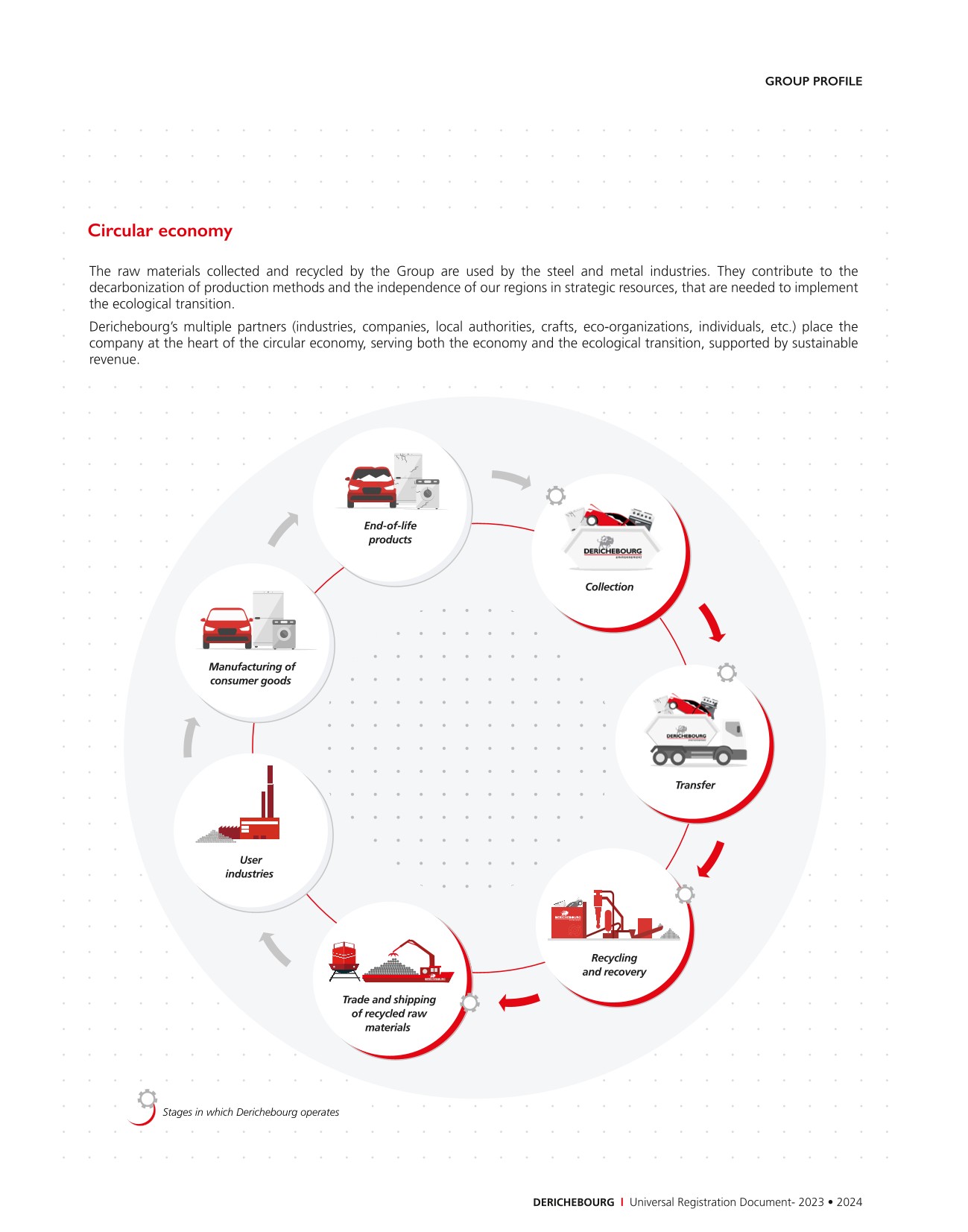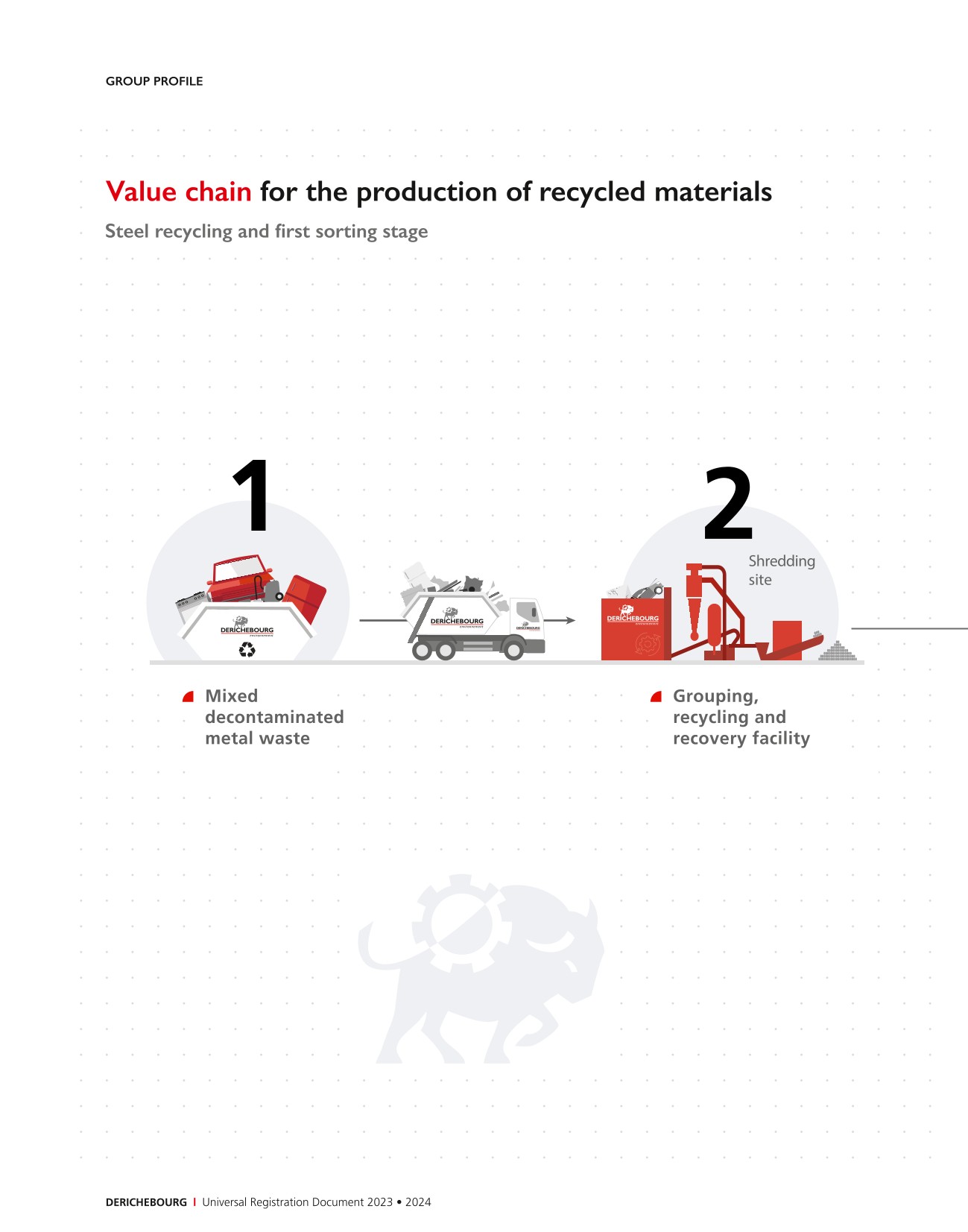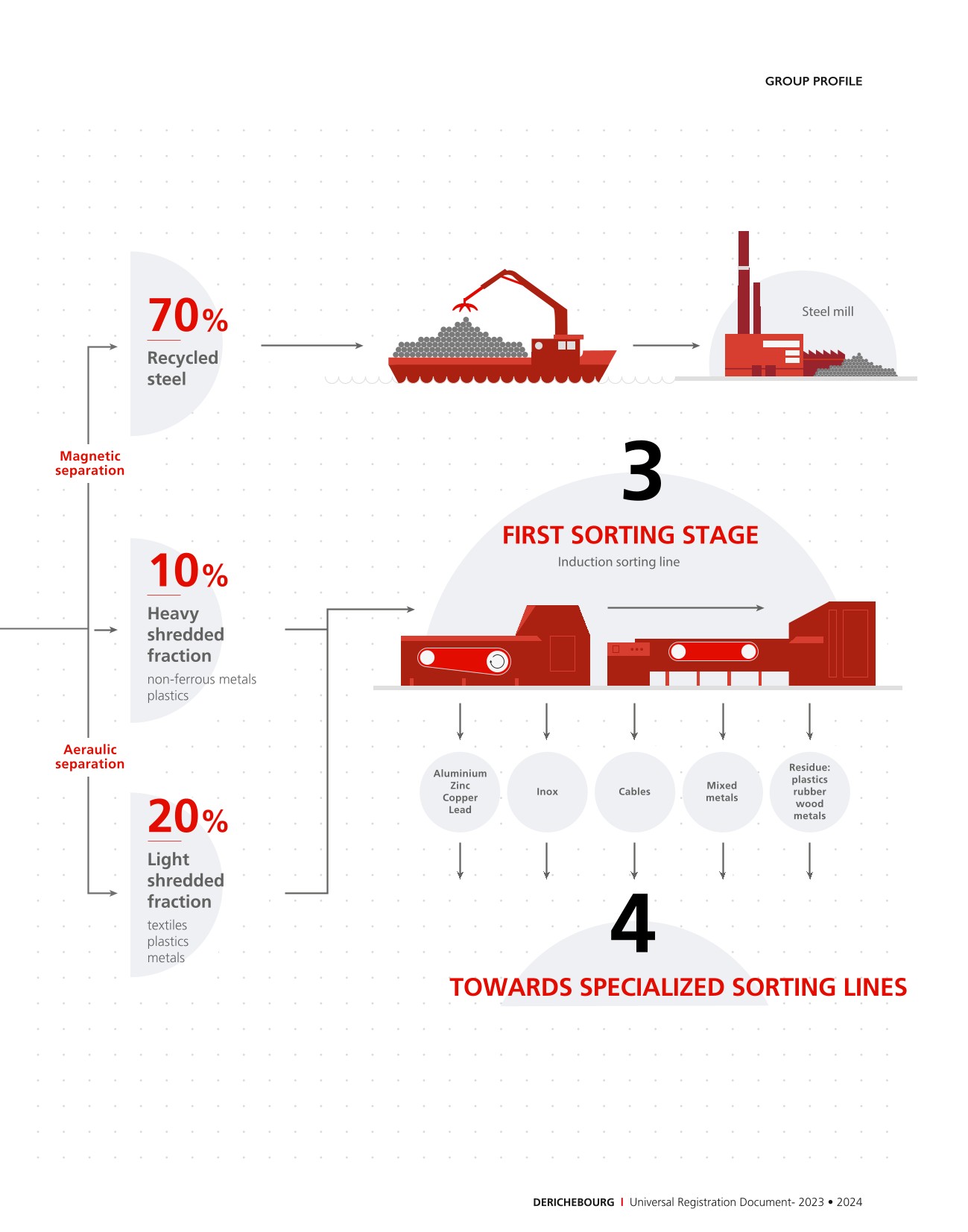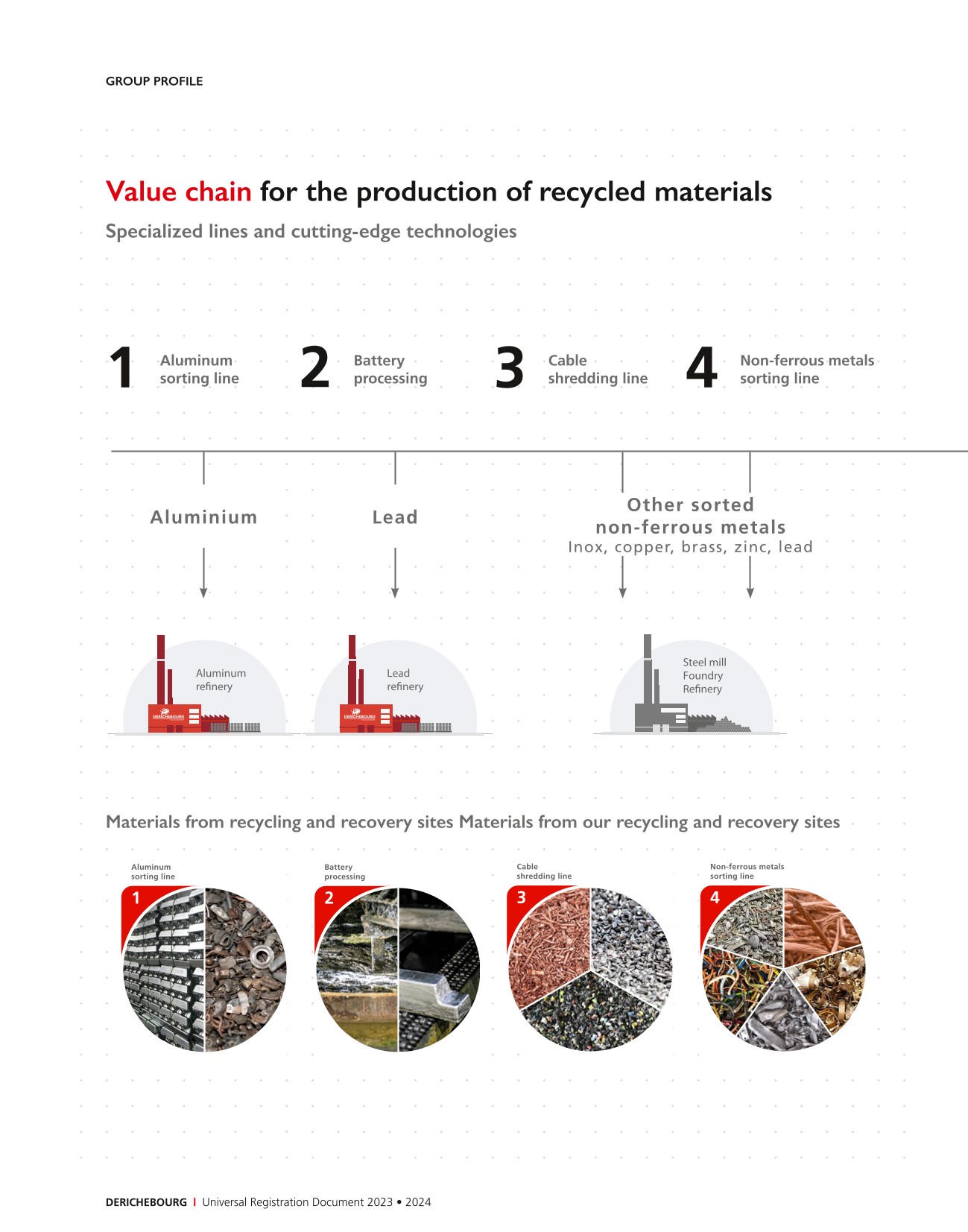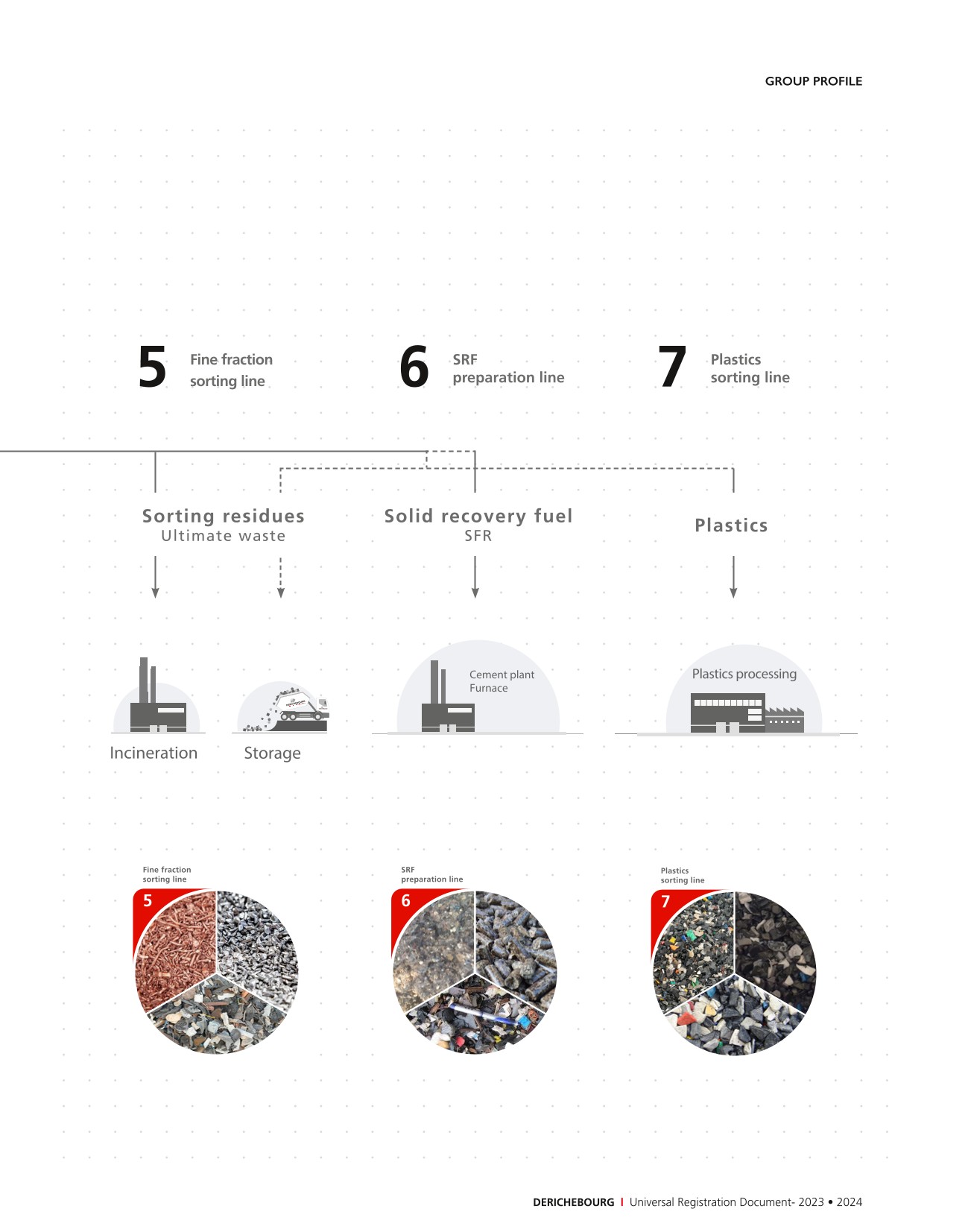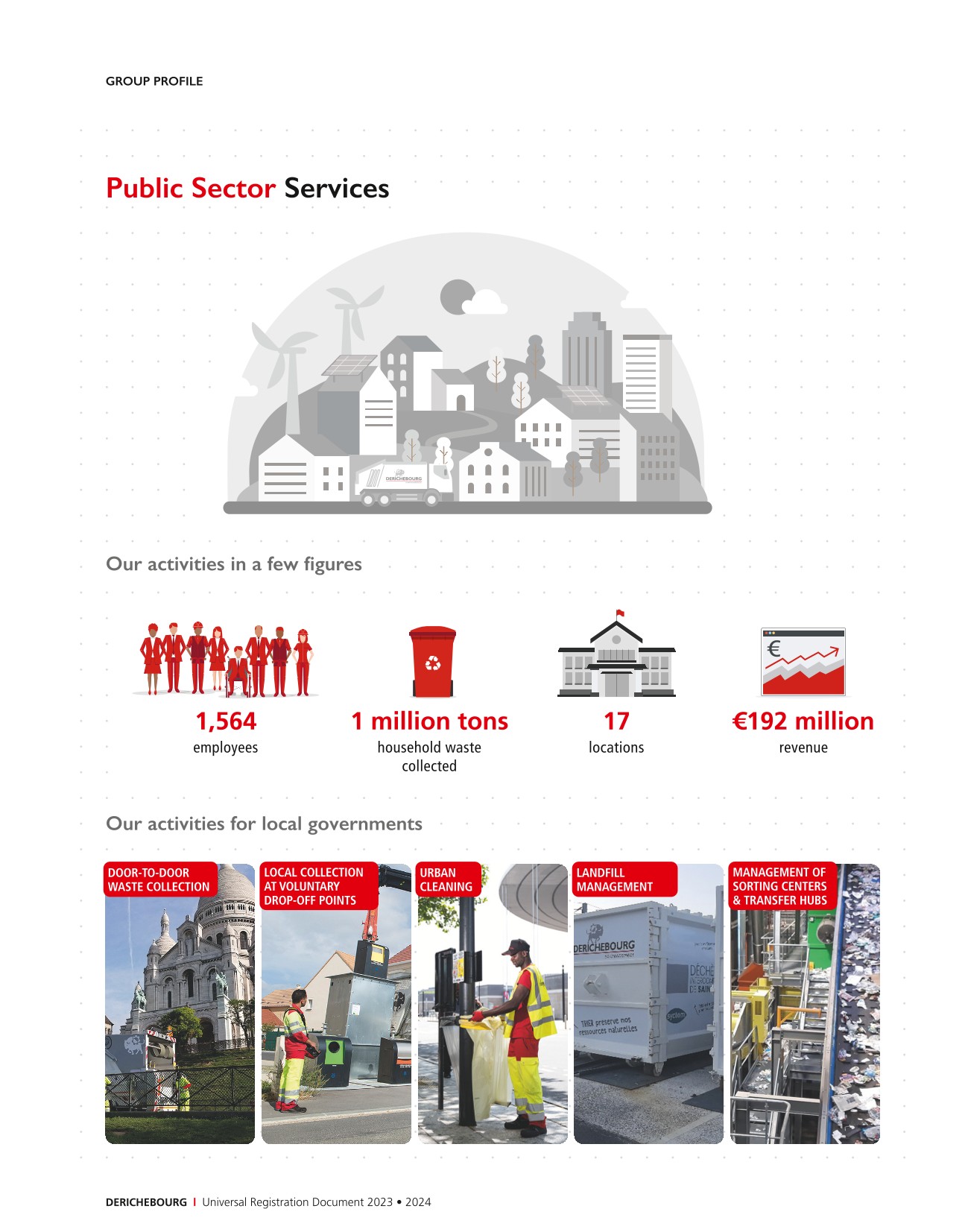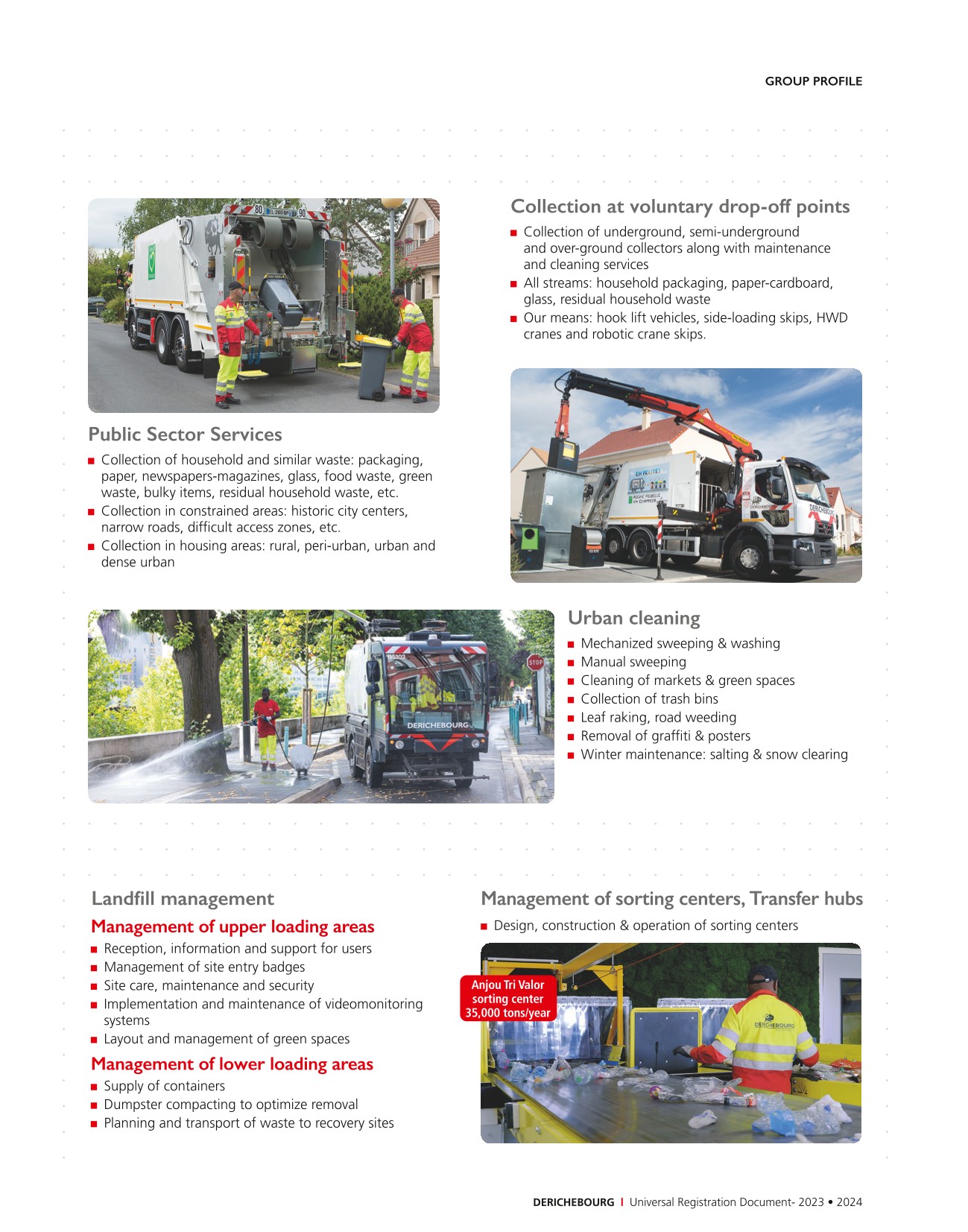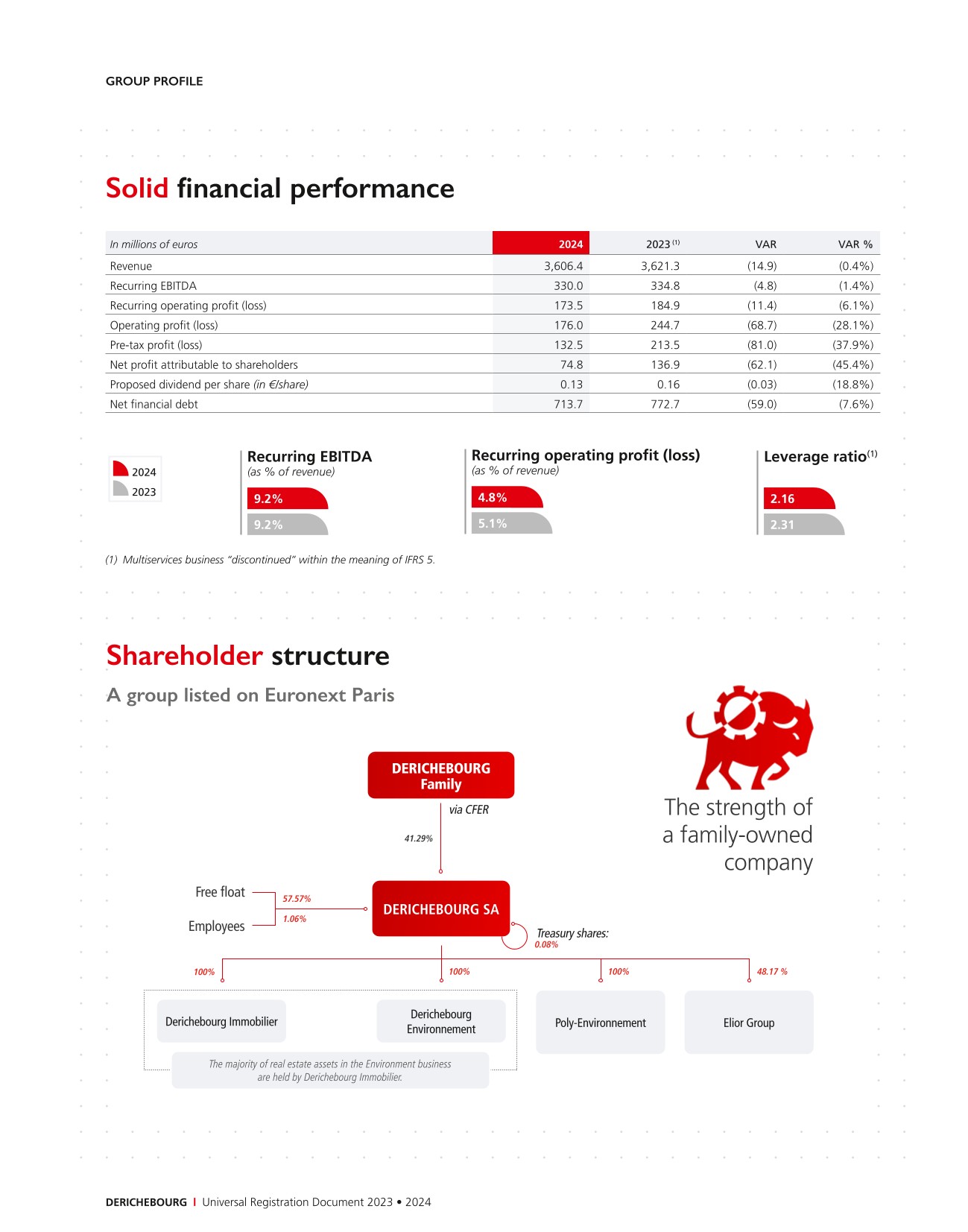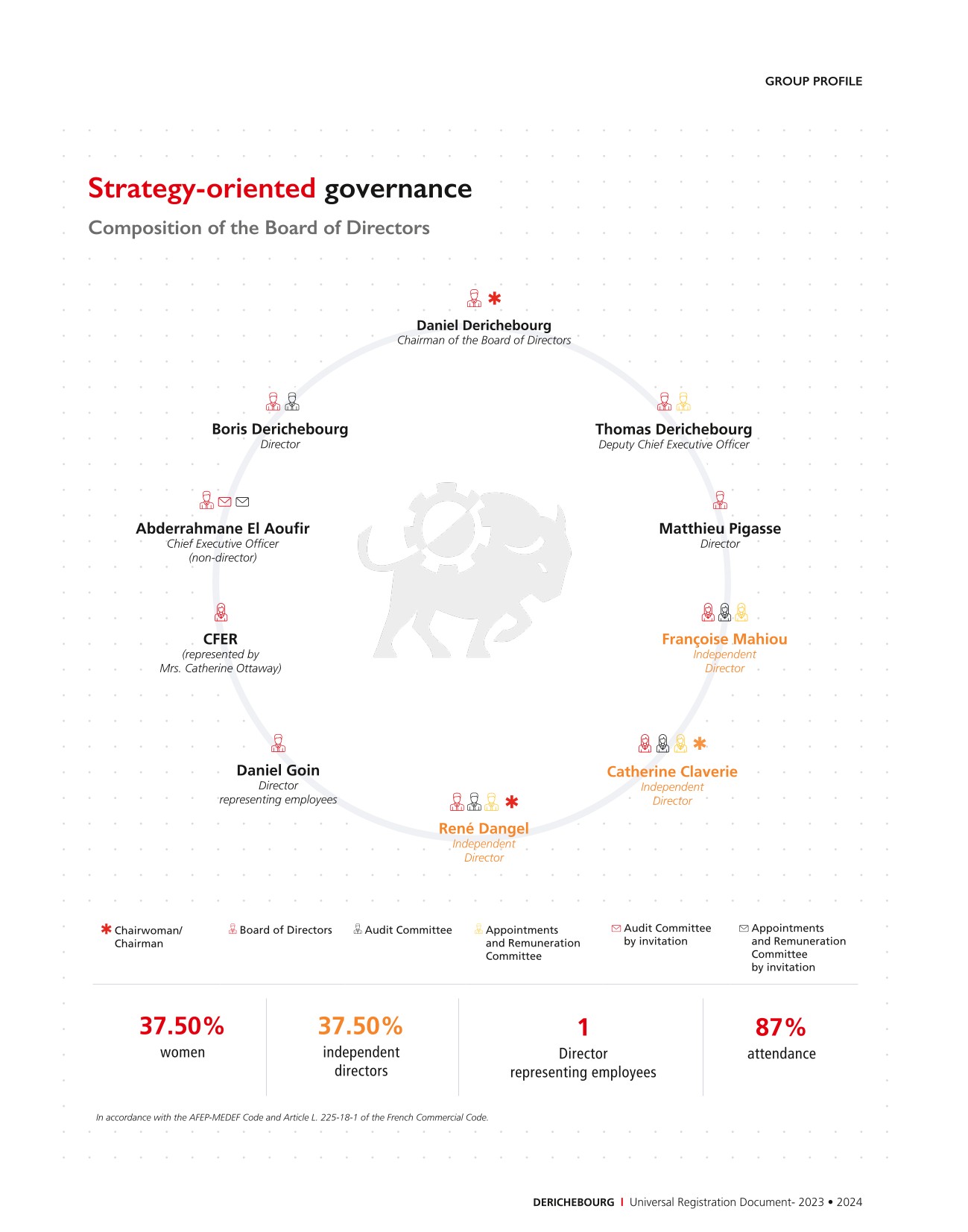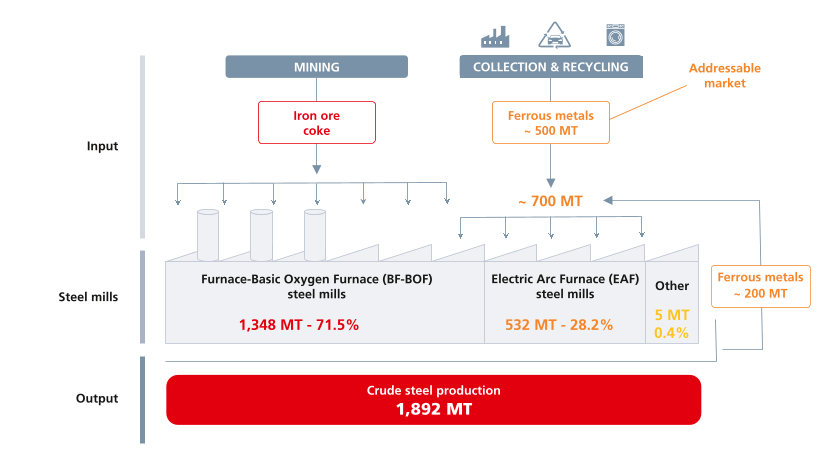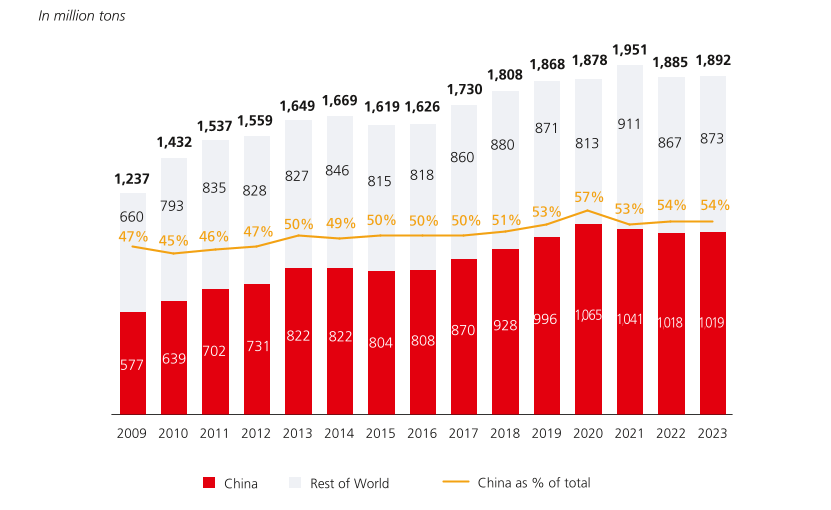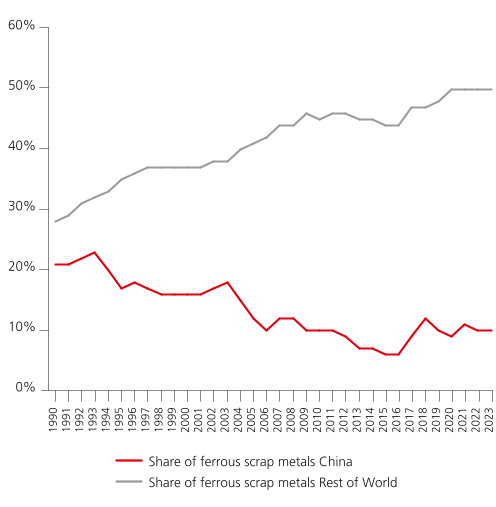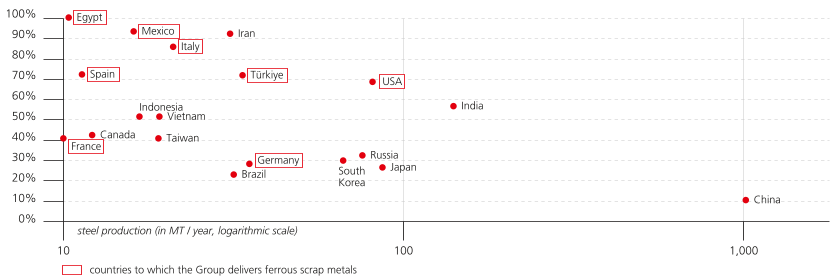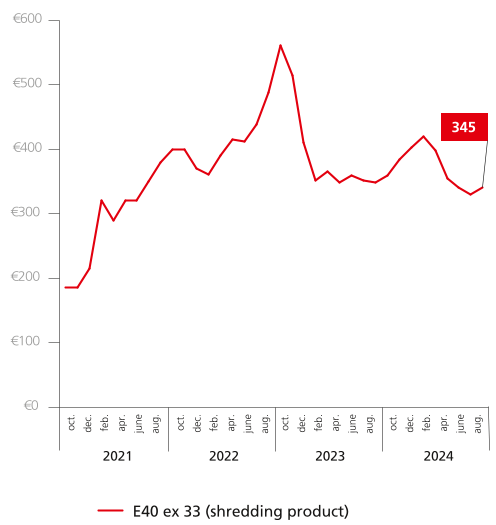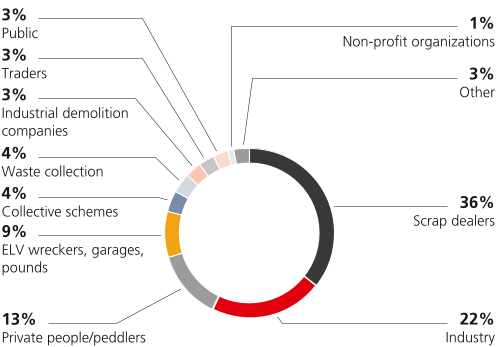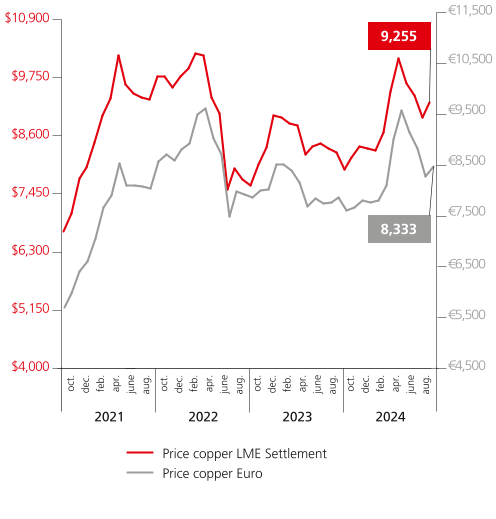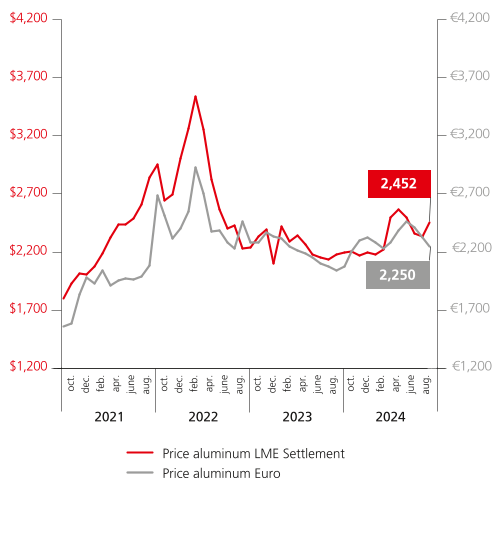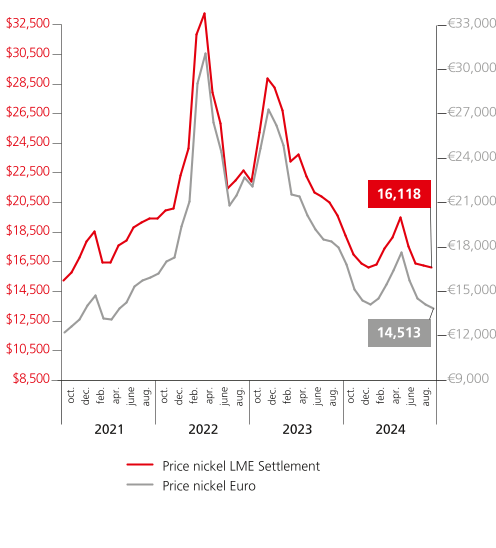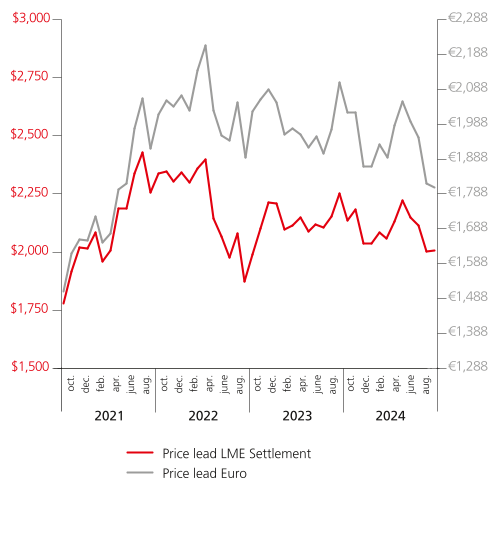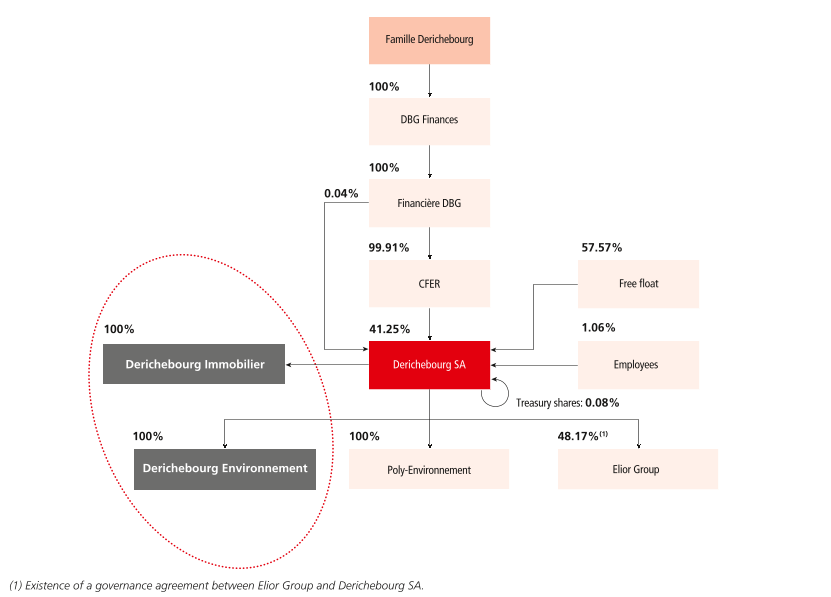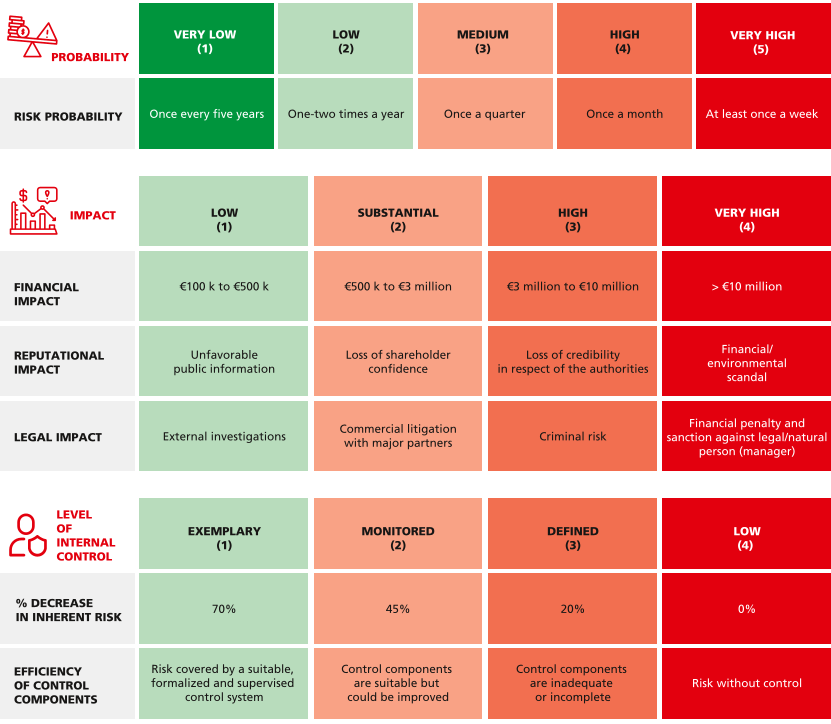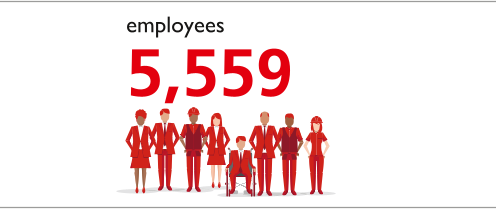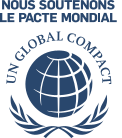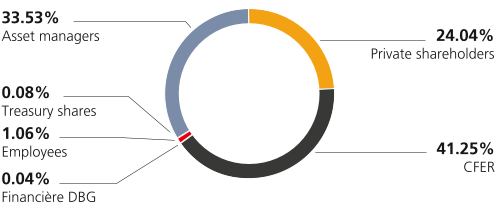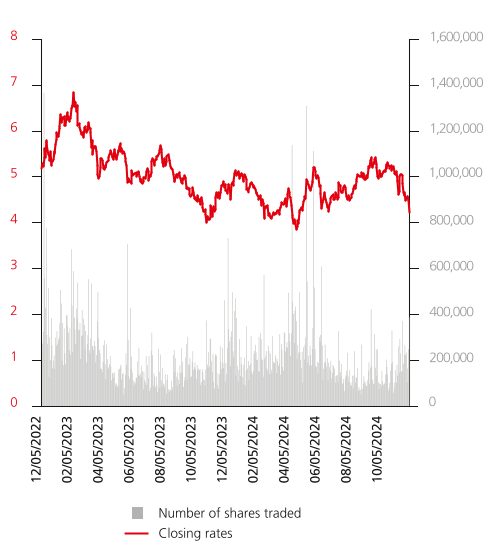URD 2024
-
Presentation of the Group and its activities
1.1A global provider of recycling and public sector services
1.1.1Services organized into two businesses
The Derichebourg Group is a leading global provider of waste recycling, mainly metal, and public sector services.
Derichebourg's offering covers the recycling of ferrous and non-ferrous waste, from collection to recovery, and various household waste collection services on behalf of local governments.
Historically, the purpose of the Recycling business is to recover predominantly metallic ferrous and non-ferrous waste from end-of-life products, and process them in the appropriate way to produce raw materials from recycling. This business has become a cornerstone of international environmental protection policy. The business is often tied to the cycles of the steel and metalwork industries, which are the consumer sectors of the products sold by the Group. Since the mid-2000s, the desire to add a more resilient business to Recycling was reflected in the acquisition of Multiservices businesses, which covers cleaning, temporary work, energy and outsourced aeronautical services. In April 2023, the Multiservices division was contributed to Elior Group and paid for by issuing new shares in this French contract catering and business services company, bringing the Derichebourg holding to 48.31%. Following the capital increase of Elior Group on April 8, 2024 through the issue of 741,520 new shares, relating to its 2021 bonus share allocation plan, the Derichebourg Group’s stake was reduced to 48.17%.
Main markets
Revenue by business segment
2024
2023 (1)
Change
in millions of euros
in %
in millions of euros
in %
Recycling
3,413
95%
3,437
95%
(0.7)%
Public Sector Services
192
5%
183
5%
5.1%
Holding companies
1
na
1
na
na
Total
3,606
100%
3,621
100%
(0.4)%
- (1)Restated following the reclassification of Derichebourg Environnement from the Holding segment to the Recycling segment as a result of the absorption of the central sales subsidiary Coframétal in December 2023
-
1.2Recycling business
Since 1956, the business of Derichebourg Environment has been the collection, sorting, recycling and recovering of ferrous and non-ferrous metals in end-of-life consumer goods (automobiles, waste electrical and electronic equipment, etc.), as well as in recuperation material (industrial demolition, for example) and new scrap from metal transformation processes (production waste).
1.2.1The recycling market
1.2.1.1The ferrous scrap metal recycling market
The ferrous scrap metal recycling market is at the interface between an upstream market (waste supply) and a downstream market (steel mill needs).
The annual ferrous scrap metal market is estimated at 700 million metric tons (source: BIR), of which 500 million metric tons are accessible to recycling companies, with the balance comprising steel waste that is recycled internally.
The global steel production reached a high point in 2021 (1,951 million metric tons) and has declined slightly since then. In 2023, it was 1,892 million metric tons. China alone accounts for 54% of global production. At the same time, the installed production capacity continued to increase (around 2,500 million metric tons). The industry is faced with overcapacity, mainly in China.
Blast furnaces consume iron ore, coke, and a small proportion of ferrous scrap metals (10-15%), which reduces greenhouse gas emissions. Electric steel mills consume ferrous scrap metals almost exclusively.
In theory, both types of mills can produce any type of steel. In practice, steel from electric steel mills is used to produce long steel and reinforcing bars. Coils are made mostly at blast furnaces.
As can be seen in the previous graph, the share of steel from electric steel mills tends to increase from year to year on a regular basis in countries other than China. The competitive advantages of steel from electric mills are as follows:
- ■less investment;
- ■increased flexibility of use, with the ability to stop and restart production;
- ■very clear environmental benefit (fewer greenhouse gas emissions per metric ton produced with a ratio of 1 to 2.3) and energy benefit (less energy consumed per metric ton produced) advantage compared to blast furnaces, especially in countries where the nuclear share of the energy mix is high;
- ■local supply;
- ■ease of access to steel production for developing countries thanks to lower investment.
The ferrous scrap metal market is also sensitive to international steel and ferrous scrap metal trade flows.
The intensity of Chinese and Turkish steel exports significantly influences the European steel market and consequently its need for ferrous scrap metal. Starting in mid-2016, China has sharply reduced its steel exports to Europe due to its strong domestic demand, which has allowed European and Turkish steelmakers to improve their production and sales in their local market. The Group’s European customers, and indirectly the Group, have benefited from this situation. Since mid-2022, these Chinese steel exports have increased again, due to a decline in domestic demand and a stable production surplus. Chinese semi-finished products are less expensive than those made in Türkiye or Europe. Chinese steel exports increased from 51 million metric tons in 2022 to 83 million metric tons in 2023, representing 22% of global exports. These exports compete with European steelmakers in their own markets, and, therefore, with the Group’s main customers by volume.
Türkiye is the world’s largest importer of ferrous scrap metal. It produces 34 million tons of steel (2023), 72% of which comes from electric steel mills, with insufficient local raw materials, and imports about 20-25 million tons of ferrous scrap metal per year, i.e. one quarter of the global trade). Unlike domestic markets, where price negotiations with steel mills occur monthly, the Turkish market buys ships on the spot market (up to 40,000 t). This means that changes in Turkish prices have an effect on the supply regions of the United States and Europe, which have a surplus of ferrous scrap metals. The economic situation in Türkiye is also a factor that influences the ferrous scrap metal market.
In recent decades, globalization and the liberalization of international trade resulted in the virtual disappearance of customs tariffs. Consequently, it was marginal demand that influenced world prices. Since the spring of 2018, the situation has changed, with the introduction of customs tariffs by the United States on the majority of steel imports.
The ferrous scrap metal recycling market is perceived as relatively volatile, insomuch as price and volume trends often compound: increased ferrous scrap metal demand by steelmakers will result in scarcity of the additional metric tons sought and put upward pressure on prices. If demand falls, the opposite happens.
End-of-life consumer goods (around 80%, including industrial demolition) and production waste from steel processing (around 20%) provide ferrous scrap metal purchasers with their supplies. The level of general economic activity therefore influences the availability of ferrous scrap metal.
Source: Derichebourg. The graph includes the purchases of ferrous scrap metal and non-ferrous metals.
1.2.1.2The non-ferrous metals (NFM) recycling market
The actors in both ferrous and non-ferrous scrap metal recycling are often the same. The volumes of non-ferrous metals processed by collectors are much lower (often one-tenth of the volume) than for ferrous scrap metals. Conversely, unit prices are much higher, as are unit margins.
For the French market (68% of the tonnage collected by the Group), the breakdown of non-ferrous metals sold by the profession is as follows:
- ■aluminum and aluminum cables: 31.5%;
- ■lead and batteries: 12.0%;
- ■stainless steel and alloys: 11.5%;
- ■copper, excluding cables and motors: 10.0%;
- ■zinc: 7.0%;
- ■copper cables: 5.0%;
- ■brass and alloys: 3.0%;
- ■electric motors: 10.0%;
- ■other: 10.0%.
NFM to be recycled are found primarily in buildings, packaging, automobiles and industrial equipment. User industries are essentially foundries, refineries and other heavy industries.
Recycling of end-of-life products will become increasingly essential since it is the only source of secondary non-ferrous metal, whereas primary resources are shrinking. Several other factors also favor the development of non-ferrous metal recycling. First, the production of primary ore is nonexistent in many areas of the world. Recycled products are thus the only “surface mine” available and are also a renewable source; in all cases, the reutilization of recovered products leads to savings in raw materials. It avoids CO2 emissions and creates energy savings compared to the production of the same quantity of metal by the primary sector.
Energy savings compared to the production of primary metal are about 60% to 80% for copper and 90% to 98% for aluminum – a clear-cut competitive advantage in a context of soaring energy costs and increasingly severe restrictions on greenhouse gas emissions.
Even so, production cost savings are partially offset by the costs of collection and by environmental restrictions in industrialized nations. These limitations are less restrictive in emerging countries, which increasingly use this type of production and import recuperated products.
Recovering of end-of-life products alone accounts for approximately 35% of global non-ferrous metal production (source: Bureau of International Recycling). The global demand for non-ferrous metals correlates strongly with changes in the global industrial production index.
A major shift occurred in 2018, with China's decision to publish very strict specifications for impurity levels in 19 classes of products (including non-ferrous metals) in order to import them into China. These maximum rates are in practice very difficult to achieve, and the volume of Chinese imports has decreased significantly since the spring of 2018. Consequently, the volumes previously consumed by China have shifted to other markets, resulting in downward pressure on the prices of various non-ferrous metals. The increase in the prices of various non-ferrous metals, which began during the post-COVID recovery of 2021, was magnified in early 2022 with the start of the war in Ukraine and subsequent fears about metal supplies, before decreasing significantly since then due to downward economic forecasts. The charts opposite summarize the price changes for various metals.
From January 1, 2021, China removed the highest grades of non-ferrous metals (especially copper granulate) from waste status and once again accepted imports of these products. However, it imports almost no solid waste now. This waste has therefore been transferred to other markets (including India, Malaysia and Vietnam).
In 2024, the European Union published a new regulation on waste exports, applicable to metals from 2027, which will modify and tighten the rules for non-OECD exports, without making them impossible.
It should be noted that these graphs, and especially those for copper and nickel, imperfectly reflect the change in the Group’s sale prices, which are based on the LME prices, but which also take into account a discount for the secondary metal. This discount changes according to market conditions. With regard to stainless steel (the majority of the value of which is made up of alloyed nickel), more and more customers are asking for prices that no longer take into account the daily evolution of nickel.
-
1.3Public Sector Services business
As an expert in cleaning, the Derichebourg Group offers local governments a range of services in three main areas:
- ■door-to-door waste collection and voluntary drop-off points;
- ■urban cleaning;
- ■managing recycling centers, transfer hubs and sorting centers.
The efficient management of household waste and urban cleaning is a major challenge for local governments. It determines the quality of life of citizens and the fulfillment of economic, social and environmental obligations that are an increasing burden on them. Poly-Environnement (France) and Derichebourg Canada collect all types of household waste (packaging, paper, cardboard, glass, green waste, food waste, bulky items, residual household waste) using all existing collection methods (door-to-door and drop-off points). These subsidiaries also manage household packaging sorting centers and transfer waste to processing and recovery centers. Lastly, Poly-Environnement offers local governments responsibility for all urban cleaning services (manual sweeping, mechanized sweeping and washing, cleaning of soiled floors, managing public bins and containers, removing graffiti, removing dumped waste etc.).
For example, through its subsidiaries, Poly-Environnement provides door-to-door collection of household and similar waste in six of the ten districts of the city of Paris entrusted to private operators (1st, 3rd, 4th, 7th, 10th and 18 arrondissements).
Public contracts generally last for a period of five to seven years. Local authorities often request new equipment when contracts are renewed.
The Group responds to tenders that give significant weight to technical considerations, thus making it possible to highlight the quality of the service and the resources deployed by the tenderer, not only the lowest price, in order to obtain a solid return on capital employed.
The Poly-Environnement entities and its subsidiaries were historically owned by Derichebourg Multiservices, and were transferred to Derichebourg SA prior to the contribution of the Multiservices division to the Elior group in April 2023.
1.3.1The waste collection market
- ■After Germany, France is the second largest producer of household waste in Europe.
- ■Per capita, a French person produces an average of 582 kg of waste, which places France in the European average. Over the 2007-2017 period, waste production per inhabitant decreased by 2%, while the overall quantity of household waste continues to increase due to the increase in the population (according to a study by ADEME on household and similar waste).
-
1.4Stake in Elior Group
Derichebourg SA holds a 48.17% stake in Elior Group, a leader in contract catering and Multiservices.
1.4.1Elior history
The Group was created in 1991 by Francis Markus, Robert Zolade and 300 executives who joined forces to acquire a 35% stake in the capital of Société Générale de Restauration, a subsidiary of the Accor group.
In 1997, the Group became the French leader in concession catering, and the following year adopted the name Elior.
In 1999, the Group decided to expand in Europe, through numerous acquisitions in the United Kingdom, Spain and Italy. A number of external growth operations were carried out in these countries during the 2000s.
In 2013, the Group entered the American market with the acquisition of TrustHouse Services, one of the leading catering companies for the education and healthcare markets in the United States. A number of new acquisitions followed in the second half of the decade, to expand the Group’s presence in this area.
In 2022, Derichebourg SA acquired a 24.36% stake in Elior Group through the purchase of shares belonging to the historical shareholder Robert Zolade and through market acquisitions.
In July 2022, Elior's management launched a strategic review aimed at improving the Company's strategic positioning and providing a solution to its high leverage ratio.
In April 2023, Derichebourg SA increased its stake to 48.31% following the contribution of the assets of its Multiservices business (see section 5.1). The aim of the transaction is to offer strong potential for value creation, with annual synergies estimated at a minimum of €30 million by 2026.
-
1.5Strategies and objectives
1.5.1The Group’s strategy in the Recycling business: “A dense network”
The Group is currently the 4th largest player in the world (and 3rd in Europe) in terms of revenue in the recycling of metal waste, behind SIMS Ltd, EMR and TSR.
- ■consolidate our position as leading supplier in steel and metallurgy by delivering products in line with customer specifications and expanding our customer base, especially for ferrous scrap metal;
- ■implement the best sorting technologies available, so that the full added value of the various products is maintained, and reduce the share of residue headed to landfill;
- ■have a management team that implements the same strategy uniformly throughout the Group, and train employees who will be able to join the management teams of the future;
- ■update the Group's IT tools while leaving intact the main features, which make it one of the most relevant tools in the market (knowledge of inventory and real-time margins at all Group sites);
- ■develop niche businesses where there are fewer players, such as induced heavy metals plant, aluminum or lead refining, and cold preparation of mixtures for steel mills that produce stainless steel. The Group also seeks to develop additional sorting for the non-ferrous metals that result from the shredding process. The Group already generates more than 25% of its Recycling business revenue in these niche segments;
- ■expand the collection network in France and abroad by being present in each country as either a national or regional leader and explore external growth opportunities over the long term. The Group is well positioned to be a consolidator for a market at cyclical lows.
-
1.6Group structure
1.6.1Structure and summary organization chart of the Group and its shareholders
- ■equity interests in two parent-holding companies, Derichebourg Environnement and Poly-Environnement, which each control the operating companies in the appropriate division;
- ■shares in DBG Holding GmbH, which owns the Recycling business in Germany;
- ■shares in Derichebourg Immobilier, which holds the majority of the real estate assets of the Recycling business;
- ■a 48.17% stake in Elior Group.
The financing of the Group’s subsidiaries is provided for the most part centrally by Derichebourg, via the syndicated loan set up on March 19, 2020, for a residual amount of €120 million (see note 4.11.1.5 of the notes to the consolidated financial statements), the Green Bond of €300 million, and the EIB loan for the residual amount of €91 million.
-
Risk factors and internal control
2.1Risk factors
2.1.1Risk analysis and monitoring process
2.1.1.1Methodology for establishing and validating the Group’s risk mapping
A mapping of the Company’s general risks was prepared during the 2018 fiscal year and is updated annually. It will be updated at regular intervals by Internal Control and the Group's Chief Financial Officer, in collaboration with the operational and functional risk-bearing departments.
The risk map for 2023-2024 was presented to General Management, which validated the main risks and the implementation of the associated action plans. This mapping is presented to the Audit Committee on an annual basis.
For informational purposes, the Group’s risk mapping also includes Sapin II (anti-corruption) and CSR risks.
2.1.1.2Criticality matrix used
-
2.2Insurance
The Group is particularly conscious of the need to prevent risks and allocates significant resources and a considerable budget to personnel training, particularly on fire risks, site security and a range of programs covering prevention, protection, security, health and the environment.
This risk management nevertheless also includes taking out insurance policies with financially sound international insurance companies. It is the responsibility of the Group’s Insurance Department, which is managed by the parent company, to identify the risks for each business sector, establish the correct balance between insurance requirements and guarantees to be entered into, as well as the acceptable levels of policy excesses and ceilings.
This is why the decision was made, from an economy of scale perspective, to negotiate policies at the central level. Consequently, all Group entities are covered by so-called “master” insurance policies that are translated into local policies in accordance with the regulations and risks identified locally. Similarly, the Insurance Department uses “master” underwriters that act as the conduit to local underwriters in the countries where the Group operates.
In this way, the Group guarantees harmonization and an optimum level of security in its insurance policies, which it reviews whenever necessary, on the basis of information fed back by subsidiaries and claim monitoring. This takes place on at least an annual basis.
Main insurance programs
The Group's insurance policy is based on more than ten programs, including the following main policies:
- ■General Public Liability Insurance: covering third-party criminal and contractual liability incurred by the Group in the event of personal injury or material and intangible damage likely to arise in the course of business operations or after delivery;
- ■Specific Public Liability Insurance for pollution risks;
- ■Property Accident Insurance: covering direct accidental and sudden material damage to the insured property. This insurance is provided by the captive reinsurance company, Derichebourg Ré;
- ■Vehicle Fleet Insurance: working from a common base, these are essentially policies adapted to the needs of local regulations;
- ■Transportation Insurance: covering claims arising from maritime, rail and ground transportation between the Group's plants and its customers;
- ■Charterer and owner's goods liability insurance, Defense and Appeal;
- ■Directors’ Liability Insurance;
- ■Workers’ Compensation Insurance, to cover work-related accidents and illness; this system is specific to the United States;
- ■Cyber/Fraud Insurance, covering extortion requests, data security, computer system availability, fraud and forgery;
- ■Credit Insurance, under the responsibility of the Group Finance Department.
-
2.3Internal control and audit
2.3.1Internal control objectives
One of the objectives of internal control is to prevent and control the risks resulting from the Company’s activity with regard to its mapping. The purpose of control procedures is to ensure that the actions of management and completion of transactions, as well as personal behavior, fall within the framework defined by the General Management guidelines.
-
Extra-financial performance
3.1CSR approach and strategy
The scope of reporting has not changed significantly compared to the previous fiscal year, which marked the contribution of the subsidiary Derichebourg Multiservices to the Elior Group. The aftermath of this contribution resulted in the exclusion of the Multiservices subsidiary from the consolidated reporting of the Derichebourg Group.
The INOREC (Recycling division) operational sites have been assigned to the PURFER or REVIVAL entities depending on their location. Polyceo (Public Sector Services division) in Marseille is no longer active following the market shutdown on March 31, 2024.
The non-ferrous metals trading activity (formerly COFRAMETAL) was integrated into Derichebourg Environnement at the beginning of the fiscal year. This transaction led to the overhaul of the Group's operating segments in terms of consolidation; Derichebourg Environnement is now part of the Recycling division.
Companies without an operational site and whose number of employees is less than five have been excluded from the consolidation. This concerns the entities SCEA du Château Guiteronde, Derichebourg SA and ECO-VHU.
Some of the policies set out below in this section apply only to a partial scope of the Group (France or Europe, for example). By default, the commitments and actions described in this chapter cover the entire scope of the Group. When they relate to a limited scope, this is specified.
3.1.1Analysis of CSR risks
The risk analysis has enabled potential risks to be identified in the social/societal, environmental, human rights, anti-corruption and tax evasion areas. The management and control systems in place make it possible to mitigate these risks and define the priority actions set out in the “Trajectory 2026” roadmap. This roadmap links the previous one called “Concretely Responsible 2018-2022” and the future obligations relating to implementing the Corporate Sustainability Reporting Directive (CSRD), which will replace the current Extra-financial Performance Statement (EFPS).
This paragraph also meets the provisions of law no. 2017-399 of March 27, 2017 on the duty of vigilance presented in section 3.7.
In 2022, a single risk mapping was drawn up which incorporates CSR risks (social, societal and environmental).
This mapping, updated in 2024, enables risks to be identified, analyzed and prioritized in order to prepare appropriate action plans using the following method:
- ■identification of risk type;
- ■prioritization and scoring of risks arising from the impact and probability of occurrence of these risks;
- ■identification of internal control systems to assess the level of risk management.
Identified risks are addressed by the actions and controls described in the CSR roadmap, with the aim of mitigating and managing them.
- ■operational risks: major accident (fire, physical injury etc.);
- ■environmental risks: climate change; air and water pollution, etc. (including IED regulations);
- ■human resources management: recruitment and management of key positions and strikes;
- ■business ethics: corruption;
- ■environmental legislation: landfill ban for shredder residues or prohibitive increase in the French general tax on polluting activities (Taxe générale sur les activités polluantes - TGAP).
The pandemic risk remains in the risk analysis. The crisis management system set up during the COVID-19 epidemic has been retained, and can be triggered if necessary.
As part of its CSR risk mitigation actions, the Derichebourg Group is rolling out its “Trajectory 2026” roadmap.
The risks listed above and presented in this chapter are the items identified as material at the end of the risk analysis. Moreover, the Group has begun work to comply with the Corporate Sustainability Reporting Directive (CSRD), which will apply to the reporting for the 2024-2025 fiscal year. It has thus begun a dual materiality analysis, within the meaning of the CSRD directive, which will structure the sustainability report for the next fiscal year.
In view of its business activities, the Group does not provide details on the following topics, as they are deemed to be immaterial:
-
3.2Business model
Business model and consideration of the climate
Climate-related risks:
Strengthening of environmental regulations in favor of the climate
Intensification of extreme climate events (physical risks)
Increased and volatile energy costs
Climate-related opportunities:
Growing demand for recycled materials that contribute to decarbonization
Increased access to green financing
Technological development and diversification of specialized lines
Positive impact of the Group's activity:
Reduction of CO2 emissions through the use of recycled materials
Preservation of natural resources and reduced energy consumption by replacing primary metals with recycled materials
Reduction of pollution related to the extraction of raw materials protecting ecosystems that regulate the carbon cycle
Negative impact of the Group's activity:
Energy consumption and CO2 emissions related to the Group's activity and the transport of collected and produced materials
Impact on strategy and financial planning:
The Derichebourg Group makes significant investments in connection with the development of specific recycling lines and technologies. As part of the preparation of its carbon transition plan under the CSRD, the Group will estimate the investments required for this transition and adaptation to climate change.
-
3.3A Group committed to protecting resources
3.3.1Consolidating our position as leader in the circular economy
The Derichebourg Group is one of the world leaders in metal waste recycling, and a leading player in household waste collection. Due to the nature of its historic scrap metal recycling business, the Group is helping to preserve natural resources (iron ore, copper, bauxite, etc.) while reducing the quantity of waste eliminated. Metal waste, first of all, undergoes a sorting process. That not requiring any processing is grouped directly by quality, then resold. Metal waste must undergo an industrial preparation process before being processed in steel mills. They are either sheared or cut (e.g. thick ferrous scrap metals), or shredded (e.g. light ferrous scrap metals or those mixed with other materials).
During the 2023-2024 fiscal year, the Derichebourg Group recycled 4.4 million metric tons of ferrous waste and 695 thousand metric tons of non-ferrous metal waste. In particular, it processed 643,700 metric tons of end-of-life vehicles (ELVs) and 376,000 metric tons of waste electrical and electronic equipment (WEEE). In doing so, it avoided the release into the atmosphere of the equivalent of 7.6 million metric tons of CO2.
In line with this metal waste processing activity, Derichebourg has vertical integration in aluminum and lead thanks to two aluminum refineries in France and one in Spain, as well as a lead refinery in Spain.
The Group is also a leading player in the production of copper granulate from used cables. It has had a second-generation shot-blasting line since September 2023. A new investment is planned for the implementation of a third line in Europe.
In order to achieve a high level of recovery of treated waste, the Group continuously invests in the acquisition of new technologies, new facilities and their maintenance.
3.3.1.1Improving the recovery of waste treated at our facilities
Regulatory context
The law on combating food waste and promoting the circular economy, published on February 10, 2020, remains at the center of French political debate. This text includes central provisions for the recycling industry, in particular an overhaul of the governance of extended producer responsibility (EPR) channels, as well as the creation of new channels.
Since this founding text, several EPR channels launched in 2022, such as DIY and garden items (DGI), sporting and leisure goods (SLG) and building waste in 2023, are gradually being put in place at the operational level, with an increase in the tonnages collected and recycled.
By 2025, in accordance with the legal deadlines, other channels involving the waste treated to date by the Derichebourg Group will be created in line with European regulations. This is the case for industrial and commercial packaging waste and batteries.
A public mission to assess the performance and governance of EPR sectors resulted in the publication of a report in July 2024. Legislative and/or regulatory developments are expected to incorporate certain recommendations.
The framework applicable to recycling end-of-life vehicles (ELVs) is undergoing rapid changes and structuring with the implementation of systems managed by car manufacturers and approved by the State. The scope of the ELV sector was extended in 2022 (addition of two- and three-wheel motor vehicles and motor quadricycles); the decree instituting an extended responsibility regime for the producers of these vehicles was published in December 2022. The regulatory framework continued to evolve in November 2023, with the publication of the ministerial order setting out the specifications for extended producer responsibility schemes, individual systems and coordinating bodies for the ELV sector. During the year 2024, the French State approved the “Recycler mon véhicule” ("Recycle my vehicle") an extended producer responsibility schemes, which brings together importers and individual systems, notably those of Nissan, Renault, Stellantis, Toyota and Volkswagen. Contracting with collection and recycling companies will be the next step.
At the same time, European Directive 2000/59/EC on end-of-life vehicles, which constitutes the benchmark European regulatory framework, is currently being revised. In July 2023, the European Commission presented a draft regulation covering the design of vehicles and their end-of-life management. The challenges of the text include the extension of the scope to other vehicles (trucks, buses, coach buses), the development of the recycled material content of new vehicles and the obligation to dismantle certain components before the mechanical recycling stage by shredding. The Derichebourg Group submitted a written contribution to the public consultation of December 4, 2023, and continues to actively monitor the legislative process at the European level.
To reduce the use of landfill facilities, France has implemented a gradual ban on the storage of non-hazardous waste that can be recovered, between January 1, 2022 and January 1, 2030. Decontamination and sorting efforts before shredding, such as the removal of vehicle bumpers and fuel tanks, help to reduce sorting residues and maximize waste recovery.
At the European level: promoting industrial sovereignty and the development of sustainable practices
The European Commission places particular emphasis on industrial sovereignty and strategic autonomy, in particular through the Critical Raw Materials Act (May 2024), requiring that 25% of the European Union's annual consumption come from recycling. Copper and aluminum, processed by the Group, are on the list of targeted materials.
Additional strategies, such as the Circular Economy Act and the Clean Industry Act, aim to improve the competitiveness of European industry by promoting sustainable practices.
Limiting the quantity of sorting residue produced
The Derichebourg Group operates 32 shredding lines for mixed metal waste worldwide, including 19 in France. The advantage of this technology is that it allows ferrous metal parts (steel items) to be separated from non-ferrous metal parts, a mixture containing metals, plastics and sorting residues.
By increasing the efficiency of the recovery of the waste that it processes, the Group strives to reduce the proportion of sorting waste sent to storage facilities to only final waste, for which no recovery is possible.
Decontamination and pre-shredding dismantling operations (bumpers, tanks, windshields in end-of-life vehicles, concrete counterweights from washing machines, etc.) also reduce the amount of shredder residues produced. During the fiscal year, the Group's sites made it possible to recover the following through pre-shredding dismantling operations:
- ■1,652 metric tons of bumpers (polypropylene);
- ■1,655 metric tons of tanks (polyethylene);
- ■13,273 metric tons of concrete.
During the fiscal year, the Group's shredding lines produced 528,260 metric tons of sorting residue (a decrease of 7.7% compared to 2022/2023).
End-of-life vehicles (ELV) segment in France
French legislation transfers responsibility for achieving recycling and recovery rates to the combination of ELV center-ELV shredder. Each shredder deals with several ELV centers, which are responsible for vehicle decontamination before shredding. The recycling rates presented below were calculated for each shredder, then a weighted average (according to the number of ELVs processed) was calculated for the Group. The data is taken from ADEME (the French green transition agency). The table below presents the average reuse and recycling rates, and the reuse and recovery rates achieved by the Group's French shredding sites overall.
It should be noted that the figures provided in this report correspond to the declarations relating to the destruction carried out during the 2022 calendar year, taking into account the delay in the certification of declarations and ADEME's publication of the official data. The average reuse and recovery rates for ELVs are stable, confirming that the actions implemented by the Group make it possible to comply with European obligations.
These rates are closely related to the processing of shredder residue. The heterogeneity of the sorting residues makes their material recovery particularly complex. To date, one of the main solutions for recovering shredder residue is to use it as a solid recovered fuel (SRF) to replace fossil fuels. This point is presented in section 3.3.1.2.
The diversification of outlets for the processing of induction waste and particles (other residues allowing recovery rates to be reached) helped turn non-metallic recovery rates upwards (material and/or energy). As an example, induction waste has a plastic component that can be recovered by cement works (energy recovery and material recovery by adding the ashes to the cement).
The Waste Electrical and Electronic Equipment (WEEE) segment
In France, WEEE is processed separately. For this waste stream, the flow recycling rates comply as a minimum with the specifications of the extended producer responsibility schemes.
The Derichebourg Group is one of the main players in the recycling of waste electrical and electronic equipment (WEEE) in France, and in particular a leader in the processing of large household appliances - cold, such as refrigerators and freezers, as well as household appliances excluding cold, such as washing machines, tumble dryers and dishwashers. This business is part of contracts with Ecosystem and Ecologic, the approved extended producer responsibility schemes for the sector.
The Derichebourg Group continues to play a central role over the 2022-2025 period with the allocation of significant volumes from the extended producer responsibility scheme ecosystem, particularly in its facilities dedicated to large end-of-life appliances. In 2024, the Group also renewed its contracts with the Ecologic extended producer responsibility scheme. These contracts are part of a new accreditation period for collective schemes, with ministerial specifications setting higher requirements for the sector, such as more ambitious recycling and recovery rates targets in comparison with European targets from 2024, and the development of repair and reuse activities.
The Group's WEEE recycling sites are committed to a certification strategy in accordance with the European WEEELABEX standard. This label guarantees extended producer responsibility schemes that the facilities carry out high-performance decontamination activities, achieve the established recycling and recovery rates and ensure the downstream traceability of final waste following processing.
The recycling and recovery rates of the Group's different units are fully compliant with regulatory requirements.
The Group does not process small household appliances (SHA) in its WEEE processing lines, with the exception of the EASO joint venture with the Envie association, which is not consolidated in the scope of consolidation of this report.
The Group is also one of the pioneers for the reintegration of WEEE into the official collection circuit. In partnership with the Ecosystem and Ecologic extended producer responsibility schemes and under “Waste Management” contracts, the Group has implemented WEEE sorting operations for batches of ferrous scrap metals intended for shredding on most of its different operating sites.
This WEEE is reintegrated into the official stream in order to be processed in compliance with the regulations in force, and is the subject of a report to the extended producer responsibility schemes. During the 2023-2024 fiscal year, the Group contributed to reintegrating 148,000 metric tons of WEEE into the official processing stream, up markedly by 29% compared to the previous fiscal year.
Overall, the Group processed 376,000 metric tons of WEEE in its 13 specialist facilities in France and Spain. These volumes are also up significantly (+12%) despite the decline in activity experienced by the Group, demonstrating the resilience of the sector.
With the implementation of hot water storage tank processing lines and the ramp-up of the Bonneuil-sur-Marne processing line for large household appliances - cold, the Group expects to continue its upward trend over the coming years.
New extended producer responsibility channels (EPR)
The Group was selected by the Ecologic extended producer responsibility scheme for collection and processing operations over the 2022-2024 period in the DIY and garden items (DGI) and sporting and leisure goods (SLG) sectors. Processing combustion DGI involves decontamination before shredding. SLG, which mainly consist of ferrous scrap metal and non-ferrous metals, are shredded at selected shredding sites. The planned national volume is 20,000 metric tons per year, although to date, the tonnages processed remain very low.
The new Building and Construction Products and Materials division (BCPM) has been operational since May 2023. Setting up a collection, reuse and recycling stream for waste from the building sector should help to combat illegal landfills. The sector is supervised by several collective schemes approved by the public authorities (Valobat, Ecominero, Valdelia, Ecomaison). The Derichebourg Group has set up around forty sites for the collection, sorting and massification of this waste. The sector is struggling to get established and the tonnages processed are low.
The Group is also present in the furniture component waste (FCW) sector. It processed around 3,544 metric tons of metal FCW during the fiscal year on behalf of the Valdelia extended producer responsibility scheme.
New recycling facilities
The Group is continuing its strategy of optimizing the recovery of treated waste by strengthening its positioning in the various EPR sectors and by developing specific recycling lines.
In addition to the latest processing lines put into production respectively at the Rennes, Colomiers, Mejorada del Campo (Spain) and Bonneuil-sur-Marne sites, in April 2024 the Group installed a new processing line for large household appliances - cold at the Strasbourg site, improving the decontamination performance and the quality of the recycled materials.
The Group has been selected by the extended producer responsibility scheme to build and operate three of the six hot water tank processing units that will be built in France, including the first in December 2024 in Bonneuil-sur-Marne (94). The other two facilities will be located in Saint-Romain-en-Gal (69) and Cheminot (57). These investment projects received financial support from the Île-de-France region as part of the “Zero waste and circular economy” scheme, and from the Auvergne-Rhône-Alpes region with the “Relocation Pack” fund.
These dedicated recycling lines will be able to extract the fluorinated and hydrocarbon gases stored in foams, which are harmful to the ozone layer. The annual volume of hot water tanks expected on these specific lines is estimated at 15,000 metric tons per facility. Recycling hot water tanks in dedicated units will prevent the emission of 3.7 metric tons of CO2 per metric ton processed(1).
The Group's new electrical cable recycling facility, located in Escautpont (59), was inaugurated in June 2024. Launched in the autumn of 2023, the new facility, supported by BPI France as part of the recovery plan, will make it possible to recover up to 20,000 metric tons of electrical cables per year at full capacity and to produce copper granulate with a purity of up to 99.9%. The recycled copper is mainly consumed by European copper refineries. It is one of the metals listed as a critical and strategic raw material by the Critical Raw Materials Act (CRMA).
3.3.1.2Improving sorting waste recovery
The Group seeks to improve the recovery of materials, and in particular of these residues, in its process through several areas of work:
- ■improving waste reception in order to avoid the reception of undesirable non-recoverable waste on its processing lines;
- ■recovering the last metallic parts;
- ■extracting plastic fractions that can be recycled;
An efficient reception process in the field improves the quality of the waste to be processed in the Group's facilities, while raising awareness among suppliers.
Regulatory changes in Europe, and particularly in France, also require increasingly high recycling and recovery rates, requiring constant investments from the Group. Its efforts in this area enable it to operate sorting and separation technologies that set benchmarks in the recycling industry. The new processing lines for mixed non-ferrous metals (heavy shredding residues) installed at the Coulombiers site (86) are proof of this. The processing line for screened non-ferrous metals (fine fractions from heavy shredding) in Bernes-sur-Oise (95) also illustrates this point.
The recovery of certain residual plastic components during waste processing is also a key component of the Group's CSR strategy, which is reflected in the search for new partnerships and new outlets.
The Group's commitment, as defined in its “Trajectory 2026” roadmap on this axis, is managed and deployed at the central level in order to guarantee a consistent global vision, particularly with regard to research and development (R&D) and opportunities. This approach makes it possible to integrate regional specificities while taking into account possible outlets by region in order to optimize the impact and relevance of the actions.
Tests are underway with various automotive suppliers for this purpose. The most advanced project is being implemented in a consortium with OPmobility (formerly Plastic Omnium), in partnership with SMALL (KATE), and Claude Bernard University - Lyon 1, and won the CORAM 2024 call for projects as part of the France 2030 plan. This project to improve the vehicle's environmental performance aims to develop automotive parts incorporating up to 50% of recycled raw materials, including up to 50% from end-of-life vehicles.
As part of its “Trajectory 2026,” the Group has set itself the target of reaching 25,000 metric tons of recycled plastics.
Lastly, the Group produces waste mixtures that are sufficiently standardized and compliant with specifications to be accepted as a solid recovered fuel (SRF) source for cement works, boilers or other manufacturers wishing to no longer use fossil fuels.
This technique will make it possible to produce fuel from waste as a substitute for fossil fuels (coal, fuel oil, etc.) and contribute to the national objectives of diversifying the electricity mix by way of a 40% reduction in fossil energy consumption by 2030.
For several years, the Group has improved the recovery of shredder residue (heavy and light) as SRF by working on the quality of the residue and searching for new partnerships, particularly with the cement industry. This mission is coordinated by a unit set up within the technical department. After the phase of tests carried out to improve the quality of this product (possibility of consuming it in a nozzle and pre-calciner) and to make it better known to potential consumers, the Group has moved over the last two years to an industrial phase with the installation of new equipment on several sites (re-shredding lines and screens). This phase will continue in 2025, with the project to create a new SRF preparation line in partnership with a cement manufacturer. At full capacity, this line will be able to process 20,000 metric tons of residue per year.
In this context, the Group has chosen to set itself the target of recovering as SRF 15% of the shredding residue produced by its facilities in Europe by 2026. Over the fiscal year, 8.6% of the shredding residue produced in Europe was already recovered as SRF.
The table below specifies the metric tons of shredder residue recovered as solid recovered fuel (Europe scope, excluding Romania).
3.3.1.3Promoting the circular economy
Faced with the numerous changes in the legislative and regulatory framework at the national and European level, the Derichebourg Group is actively involved in reaching out to public decision-makers, local elected representatives and parliamentarians in the regions, but also to schools and academia.
The unit in charge of institutional relations was strengthened in September 2022 through the recruitment of a project manager, and in September 2023 through the recruitment of a work-study student to support the person responsible for institutional relations.
In order to keep its many stakeholders informed, the Derichebourg Group publishes a Circular Economy Newsletter, intended to share its news and contribute to a better understanding of its challenges. This external newsletter is sent to national and local authorities as well as to partners: it reviews the regulatory changes impacting the recycling sector and the Group's main achievements.
The promotion of the business sector also involves arranging site visits to raise awareness of the recycling business, which is an essential pillar of the circular economy. A number of representatives of the European Commission, the Ministry for the Ecological Transition, the Ministry of the Economy, the National Gendarmerie, the General Secretariat for Ecological Planning, the French Ecological Transition Agency (ADEME), the Regions, legislators, inter-municipal authorities, mayors and students were hosted at various facilities.
Global Recycling Day, which takes place every year on March 18, was the day chosen to arrange a visit bringing together around 100 participants dedicated to the teams of the French Ecological Transition Agency (ADEME), Angers Loire Métropole and SIVERT de l'Est Anjou at the Anjou Tri Valor selective collection sorting center, operated by the Derichebourg Group near Angers (49). The inauguration of the Group's new electrical cable recycling facility, located in Escautpont (59) and inaugurated in June 2024, was another highlight of the fiscal year.
As part of the roll-out of the REP ASL channel, the Minister of Sports and the Olympic and Paralympic Games, Ms. Amélie Oudéa-Castéra, launched the Grande collection du sport (Grand Sports Collection) on March 20, 2024, on a Derichebourg Group site located in the port of Gennevilliers (92) in Île-de-France.
The Group is increasingly approached by schools to arrange discussions and talks for middle and high school students, as well as higher education institutions. Partnerships with AgroParisTech, the University of Le Mans, INSA Lyon and the PEPR Recyclage (Recycling, Recyclability & Material Reuse) research program have been initiated or are continuing.
Since 2021, the Group's initiative targeting younger generations has also been reflected in its support for the “I film the job that I like” (“Je filme le métier qui me plaît“) competition. Sponsored by the government, the competition aims to introduce middle school, high school and higher education students to the professional world. In this context, the Group offers some 20 sites to schools, which can come and film the Company's activities and conduct interviews with employees. The official ceremony of the 17th edition of this initiative took place in May 2024 at the Grand Rex, attended by 2,700 people. In the “Recycling, an industry serving the planet” category, the film shot at our Avrillé (49) site was awarded the Clap d'Or award. The Group is continuing its involvement in the 18th edition, which began in September 2024. To support the Euro-France association, which organizes the competition, part of the apprenticeship tax is donated to this body.
In 2024, the Derichebourg Group renewed its participation in the citizen exhibition “Les Gueules de l'Emploi” (“The Faces of Employment”) with new portraits of employees in the regions. This 100% digital exhibition, dedicated to the general public, aims to highlight professions intended to create vocations, in particular among the youngest, by presenting employees, their career paths and aspirations, and their skills. The unprecedented photographic exhibition is dedicated to the passion for “doing the right thing” in the world of work and promoting men and women from all professional backgrounds who are proud of their company. The creative line of the photographer generates a balance between close-ups of the employees and highlighting a symbolic object characterizing their profession.
-
3.4People at the heart of the Group's organization
The nature of its businesses means that the Derichebourg Group is a significant provider of local jobs.
The Group's activities require its recycling and waste collection platforms to be located as close as possible to the waste to be treated. As a result, these local activities generate employment that cannot be off-shored.
Breakdown by country and by business
The overall headcount decreased during the fiscal year (-6%). Those of the Recycling division were stable on a like-for-like basis. The apparent increase is linked to the incorporation of Derichebourg Environnement's employees. These employees were previously presented separately (Holding section). They are now grouped together with the Recycling business.
The headcount of the Public Sector Services division decreased by 11% due to the loss of the household waste collection and urban cleaning markets in Marseille (end of contract on April 1, 2024), Reunion Island (end of the Saint-Joseph / Saint-Philippe contract as of June 30, 2024) and Polybuis (Puteaux, end of contract on June 30, 2024). As a reminder, the employees used for the lost contracts are taken over by the new contract awardee, in accordance with Articles L. 1224-1 et seq. of the French Labor Code.
Hiring and departures
Hires across the Group were down by 11.6%. In the Recycling division, hires remained stable (the hires presented in the Holding company in 2023 are now recorded within this division).
In the Public Sector Services division, new hires decreased by 28% compared to the previous fiscal year. New hires in the Public Sector Services division were linked to the start-up of several new contracts in the previous fiscal year. This need for new hires did not arise in the 2023-2024 fiscal year.
With regard to departures, there was an increase of 6.8% at Group level compared to the previous fiscal year. The Recycling division experienced a stabilization of its headcount after significant changes related to the integration of the Ecore Group over the last two years, which resulted in a decrease in departures of 21.4%. The latter is thus significant in the four subsidiaries concerned (AFM Recyclage, Eska, Purfer, Revival). In the Public Sector Services division, the departures almost doubled due to the end of several contracts mentioned above.
-
3.5Acting as a trusted partner
3.5.1Major global initiatives and certifications
The Group has been a signatory of the UN Global Compact since 2013. This commitment is an undertaking to respect the 10 universal principles of the Global Compact regarding human rights, international labor standards, the environment and combating corruption, and to support the United Nations Sustainable Development Goals.
In 2024, the Derichebourg Group did not renew its participation in the Carbon Disclosure Project's (CDP) environmental impact assessment campaign, a reference platform for environmental reporting intended for investors, companies, cities, states and regions. This decision is part of the Group's desire to focus fully on the implementation of its transition plan, with a year dedicated to the analysis and preparation of its actions, with a view to meeting the requirements of the CSRD. This non-renewal is temporary and aims to strengthen the Group's strategy before resuming structured communication in line with new regulatory expectations.
3.5.1.1ESG ratings
The Derichebourg Group is monitored and rated by several French and international extra-financial rating agencies that assess its sustainability policy.
Organization
Rating
Date
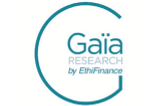
Gaïa Research
by EthiFinance (Qivalio)
ESG rating
61/100
February 2024
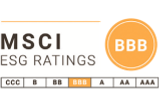
MSCI ESG (1)
ESG rating
BBB
March 2024

Moody's ESG Solutions
ESG rating
50/100
February 2023
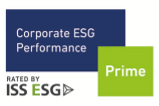
ISS ESG
ESG rating
B- / Prime
July 2023
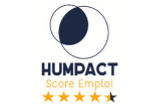
Humpact
Social Rating
4.5/5
November 2023
- (1)The use by Derichebourg of any MSCI ESG Research LLC or its affiliates (“MSCI”) data, and the use of MSCI logos, trademarks, service marks or index names herein, do not constitute a sponsorship, endorsement, recommendation or promotion of Derichebourg by MSCI. MSCI services and data are the property of MSCI or its information providers, and are provided “as-is” and without warranty. MSCI names and logos are trademarks or service marks of MSCI.
3.5.1.2Certifications
- ■Platinum level: Revival: 81/100;
- ■Silver level: Eska: 68/100; Purfer: 71/100; Refinal Industries: 66/100;
- ■Committed: Derichebourg Environnement: 53/100;
- ■AFM Recyclage is currently being assessed.
-
3.6Summary dashboard of the Group's objectives on environmental, social and governance issues
The purpose of this table is to highlight the indicators that best illustrate the impact of the Group's business and actions on environmental, social, societal and governance criteria. The figures presented below are detailed in the previous chapters.
2026 targets
2024
2023
ENVIRONMENT
Proportion of shredder residue recovered as SRF (Europe scope excluding Romania)*
15%
8.6%
7%
Metric tons of plastic recycled each year
25,000
24,500
22,700
Share of eligible turnover aligned with the European Green Taxonomy
80%
92.8%
91%
Reduction of GHG emissions (scopes 1 and 2)
Determination in progress
-4.5%
-1.4%
Reduction of scope 3 GHG emissions
Determination in progress
-6.3%
-8.6%
Installed photovoltaic power
2 MW
0
0
Proportion of “critical” sites having undergone a fire audit
100%
80%
66.0%
SOCIAL
Workplace accident frequency rate for Group employees
28.5
28.1
28.9
Workplace accident frequency rate for temporary workers
28.5
21.6
28.3
Workplace accident severity rate for Group employees
2.3
2.7
2.5
Proportion of employees under work-study contracts (France scope)**
2%
1%
1%
Proportion of positions of responsibility held by women
20%
18.4%
17.6%
Proportion of women on management committees (Recycling and Public Sector Services)
30%
31.8%
28.6%
GOVERNANCE
Proportion of employees trained on the Code of Conduct
90%
95.2%
98%
* Coverage rate of the “Proportion of shredder residue recovered as SRF” indicator: 85.9% of the tonnages of shredding residue
** Coverage rate of the “Proportion of employees under work-study contracts” indicator: 77%
-
3.7Duty of vigilance - Vigilance plan
This section sets out the Derichebourg Group's vigilance plan for the 2023-2024 fiscal year. It incorporates the provisions of law no. 2017-399 of March 27, 2017 on the duty of vigilance, which are based on “reasonable vigilance measures to identify risks and prevent serious violations of human rights and fundamental freedoms, the health and safety of persons and the environment.”
The Group is still waiting for the French transposition of the European directive on the duty of vigilance of companies in terms of sustainability (CS3D(9)) in July 2026, which will come into force in July 2027 and could have internal impacts on the management and organization of the system.
The Group has a Group risk map that includes the various CSR risks. These risks are reviewed annually and are adapted to the CSR strategy. The CSR risks identified are presented in section 2.1 “Risk factors.” These risks are related to human rights, personal health and safety and the environment.
- ■Vigilance towards human rights and fundamental freedoms.
-
In
order to communicate its values, the Group has an ethics charter for its employees and stakeholders
(customers, suppliers, intermediaries, etc.). It describes the following Group principles:
- ■the Group undertakes to comply with the laws and regulations in each country in which it operates,
- ■the Group guarantees to its employees and stakeholders a working environment that excludes any discrimination based on gender, sexual orientation, ethnic origin or religion, employee representative status or being in a trade union role, political opinions, disability, age and any other offensive physical, verbal or visual behavior. Any form of harassment is prohibited and punishable in accordance with current national legislation,
- ■the Group respects the privacy of its employees and protects their personal data,
- ■the Group guarantees adequate working conditions to its employees, including health and safety. Employees have a duty to contribute to this by complying with the Company's rules in this area,
- ■the Group has an active disability policy by encouraging the employment and integration of employees with disabilities, and by supporting people if a disability occurs during their professional life,
- ■the Group ensures compliance with the rules of fair and equitable competition. No action by the Group shall prevent, restrict or distort competition.
-
■Vigilance
towards health and safety:
- ■as a committed employer, the Group is renewing its involvement in the themes already established, in addition to compliance with regulations and in order to set ambitious targets. These include protecting employee health and safety by rolling out an occupational health and safety network, developing a culture of prevention, pursuing actions for employment and skills development, guaranteeing respect for rights and non-discrimination, helping to build a society based on solidarity by developing a regional focus and promoting diversity.
-
■Vigilance
towards the environment:
- ■to reduce its environmental footprint, the Group is pursuing actions aimed at carbon neutrality by developing “soft” mobility, by improving the energy performance of its transportation and enhancing the impact of its facilities (ISO 14001 certification target for all of the Group's operational sites),
- ■in addition, the Group makes a continuous contribution to preserving natural resources by recycling metal waste and playing an active role in the circular economy. Actions aimed at recovering waste treatment in the facilities (reducing the quantity of sorting residues and recovery of them in the form of for example Solid Recovery Fuel) are carried out with a long-term objective.
- ■The whistleblowing platform accessible via the link https://bkms-system.com/Derichebourg-alert makes it possible to file written or oral reports on health, safety, violations of human rights and fundamental freedoms and damage to the environment.
-
■The
monitoring of measurements and assessment of their effectiveness is ensured by:
- ■General Management, which validates the CSR roadmap,
- ■the Appointments, Remuneration and CSR Committee, which monitors the CSR roadmap;
- ■the Group's internal control,
- ■the annual audit by a third party independent organization.
-
3.8Report by the independent third party organization on the consolidated statement of extra-financial performance
As an independent third party (“Third Party”) accredited by COFRAC (COFRAC Inspection Accreditation, No. 3-1891, scope available on www.cofrac.fr) and a member of the network of one of the Statutory Auditors of your Company (hereinafter the “Entity”), we carried out work to formulate a reasoned opinion expressing a conclusion of moderate assurance on the compliance of the consolidated statement of extra-financial performance for the fiscal year ended September 30, 2024 (hereinafter the “Statement”) in accordance with the provisions of Article R. 225-105 of the French Commercial Code and on the fairness of the historical information (recorded or extrapolated) provided pursuant to 3° of I and II of Article R. 225-105 of the French Commercial Code (hereinafter the “Information”), prepared in accordance with the Entity's procedures (hereinafter the “Guidelines”), presented in the management report, pursuant to the provisions of Articles L. 225-102-1, R. 225-105 and R. 225-105-1 of the French Commercial Code.
Conclusion
Based on the procedures that we have implemented, as described in the “Nature and scope of the work“ section, and the evidence that we have obtained, we have not detected any material misstatements that could call into question the fact that the consolidated statement of extra-financial performance complies with the applicable regulatory provisions and that the Information, taken as a whole, is fairly presented in accordance with the Guidelines.
-
Corporate governance report
This report was prepared in accordance with Articles L. 225-37 et seq. and L. 22-10-8 to L. 22-10-11 of the French Commercial Code and was presented to the Appointments, Remuneration and CSR Committee on December 4, 2024, then approved by the Board of Directors on December 5, 2024. In particular, it reports on the composition of the administrative and management bodies, the conditions for preparing and organizing the work of the Board, remuneration components for corporate officers and the remuneration policy for corporate officers.
4.1Overview of governance
4.1.1Corporate Governance Code and internal regulations
Corporate Governance Code
The Company refers to the AFEP-MEDEF Corporate Governance Code for listed Companies as revised in December 2022. This code is available on the MEDEF website www.medef.com.
The table below shows the recommendations of the AFEP-MEDEF Code not yet applied by the Company in accordance with the “comply or explain” rule.
Code Article
AFEP-MEDEF recommendation
Implemented by Derichebourg
5.3 and 5.4
Quantified climate targets
The Company will publish quantified climate objectives in its first report prepared in accordance with the CSRD directive, i.e. the report for the fiscal year ended September 30, 2025
23
Termination of employment contract in the event of a corporate office
The executive corporate officers have kept their employment contracts previously entered into
25
Signing of a non-competition agreement with an executive corporate officer
No executive corporate officer is bound by a non-compete agreement
26.1.1
Consideration of climate targets in the remuneration of the executive corporate officers
The remuneration of the executive corporate officers includes CSR targets, but does not currently include any climate targets. This situation will be reviewed when the Company has quantified climate targets
27.2
Equity ratio
Due to a range of different types of employment contract and the use of part-time work, the Company has not been able to provide a ratio over the last five fiscal years. For the moment, it has been limited to fiscal years starting in or after 2021
Board of Directors' internal regulations
The functioning of the Company's Board of Directors is governed by internal regulations approved by the Board at its meeting on June 24, 2004 and successively modified on December 12, 2006, May 27, 2010, October 22, 2018 and January 27, 2022. The last change was made on November 16, 2023, which introduced an obligation for executive corporate officers to hold at least one share. On this occasion, the powers of the Appointments and Remuneration Committee were extended to include social and environmental responsibility.
- ■the rules governing the composition of the Board;
- ■the Board of Directors' duties;
- ■the procedures for convening Board meetings;
- ■the procedures for participating in Board meetings by videoconference or teleconference;
- ■the requirements for the creation and functioning of specialized committees;
- ■the role of the Audit Committee;
- ■the role of the Appointments, Remuneration and CSR Committee;
- ■the directors' duty of confidentiality;
- ■the directors' duty of independence;
- ■the directors' duty of diligence;
- ■the scope of the internal regulations.
In addition to the duties assigned by law and the bylaws, the Board approves strategic choices, budgets, significant acquisitions and disposals, restructurings and ensures the quality and reliability of the financial and non-financial information and communications distributed to shareholders.
The internal regulations define the rights and commitments of the directors and place particular emphasis on attendance, confidentiality of the information conveyed, the right of directors to be informed and restrictions on interventions on Derichebourg stock.
-
4.2The Board of Directors
4.2.1Rules applicable to the appointment and replacement of members
Composition of the Board of Directors (Article 14)
“The Company shall be managed by a Board of Directors made up of at least three and no more than eighteen members. However, in the event of a merger, this threshold of eighteen persons may be exceeded in accordance with the requirements and limits established by the French Commercial Code.
Directors are appointed by an Ordinary General Meeting, which may dismiss them at any time. In the event of a merger or demerger, they may be appointed by an Extraordinary General Meeting. Legal entities that are appointed directors shall designate a permanent representative, who shall be subject to the same requirements and obligations as if he/she were a director in his/her own name.
An employee of the Company may be appointed as a director only if his/her employment contract is for an actual position.
The number of directors bound to the Company by an employment contract shall not exceed one third of the directors in office, barring exceptions provided for by law, particularly in the case of directors elected on the proposal of employee shareholders or directors elected by employees or appointed pursuant to Article L. 225-27-1 of the French Commercial Code.
Director(s) representing employees
In accordance with legal provisions, when the number of directors, calculated in accordance with Article L. 225-27-1-II of the French Commercial Code, is less than or equal to eight, a director representing employees shall be appointed by the Company's Social and Economic Committee.
When the number of directors, calculated in accordance with Article L. 225-27-1-II of the French Commercial Code, is greater than eight, and provided that this criterion is still met on the day of appointment, a second director representing employees is appointed in accordance with Article L. 225-27-1-III of the French Commercial Code.
In accordance with Article L. 225-28 of the French Commercial Code, directors appointed by the Social and Economic Committee must have an employment contract with the Company or one of its direct or indirect subsidiaries whose registered office is located in France for at least two years prior to their appointment.
If the number of members of the Board of Directors, calculated in accordance with Article L. 225-27-1 II of the French Commercial Code, becomes equal to or less than eight, the term of office of the second director representing employees shall continue until its expiration.
These directors are not taken into account when calculating the minimum and maximum number of directors provided for in Article L. 22-17 of the French Commercial Code, nor for the application of the first paragraph of Article L. 225-18-1 of said code.
The term of office of a director representing employees is 4 years. Their duties shall expire at the end of the General Shareholders' Meeting called upon to approve the financial statements for the previous fiscal year, and held in the year in which their term of office expires.
Directors representing employees shall take office at the end of the term of office of outgoing directors representing employees. Exceptionally, the first directors representing employees shall take office at the first meeting of the Board of Directors held after their appointment.
The term of office of directors representing employees ends early under the conditions provided for by law and by this Article. In particular, it shall be terminated automatically in the event of termination of the employment contract.
In the event that the role of one of the directors representing employees is vacated by death, resignation, revocation, termination of the employment contract or for any other reason whatsoever, the vacant position shall be filled by an employee appointed under the same conditions. The term of office of the director thus appointed shall end at the end of the normal term of office of the director(s) representing employees that he/she has replaced.
Subject to the provisions of the law or of this Article, directors representing employees have the same rights, are subject to the same obligations, in particular as regards confidentiality, and incur the same responsibilities as the other members of the Board.
In addition to the provisions of Articles L. 225-29, L. 22-10-6 and L. 22-10-7 of the French Commercial Code, please note that, insofar as required, a failure by the body set out by these Company bylaws to appoint a director representing employees, in accordance with the law and this Article, shall not affect the validity of the Board of Directors' decisions.
In the event that the obligation to appoint one or more directors representing employees, pursuant to L. 225-27-1 of the French Commercial Code, lapses, the term of office of the director(s) representing employees shall end upon expiration of a period of thirty days following the meeting during which the Board notes that these provisions are no longer in scope.“
Term of office – age limit (Article 15)
“The term of office of directors shall be four (4) years, which shall expire at the conclusion of the Ordinary General Meeting that votes on the financial statements for the previous fiscal year and that is held during the year in which the term of office expires. All directors whose term of office expires shall be eligible for reappointment. By way of exception, the Ordinary General Meeting may appoint certain directors for a term of less than four years or, as the case may be, reduce the term of office of one or more directors, in order to allow for a staggered renewal of directors' terms of office. The number of directors having reached the age of eighty (80) years shall not exceed one-third of the number of members of the Board of Directors. If this limit is reached, the oldest director shall be deemed to have resigned automatically.“
Chairmanship of the Board (Article 16)
“From among its members, the Board shall elect a Chairman, who shall be required to be an individual. The Chairman's term of office shall not exceed his/her term of office as director. The Board shall establish the Chairman's remuneration. The Board of Directors may dismiss the Chairman at any time. The Chairman of the Board must be less than eighty (80) years of age.
When the Chairman reaches this age, he/she shall be deemed to have resigned automatically. However, his/her term of office is extended until the next meeting of the Board of Directors, at which his/her successor will be appointed.
The Chairman of the Board of Directors shall organize and manage the work of the Board of Directors, and report thereon to the General Meeting. The Chairman shall ensure the proper operation of the Company's governing bodies and, in particular, shall ensure that the directors are capable of performing their duties. If it deems necessary, the Board may appoint one or more Vice-Chairmen, whose duties shall consist exclusively of chairing Board meetings and General Meetings in the absence of the Chairman.
-
4.3Specialized committees
The Board of Directors decided to set up two specialized committees: the Audit Committee and the Appointments, Remuneration and CSR Committee.
Each committee has its own internal regulations that set out its composition, duties and operating procedures.
The committees examine and prepare certain decisions of the Board of Directors. They issue opinions and recommendations in their area of expertise and report on their work to the Board of Directors.
The composition of the committees is decided by the Board of Directors and may be amended at any time by decision of the latter.
4.3.1Audit Committee
The Board is assisted by an Audit Committee composed of four directors, of whom three are independent directors:
- ■Mr. René Dangel, Independent Director, Chairman;
- ■Françoise Mahiou, Independent Director;
- ■Catherine Claverie, Independent Director;
- ■Mr. Boris Derichebourg, Director.
This composition complies with the threshold of two-thirds of independent directors as recommended by the AFEP-MEDEF Code.
At the request of the Committee members, executive corporate officers may be invited to attend committee meetings as guests, depending on the issues examined.
During these meetings, the Audit Committee regularly calls on the CSR Manager, the IT Director and the Internal Control Manager, depending on the issues examined.
The Audit Committee may also use external technical studies. The members of the Committee did not consider it necessary to use this option during this fiscal year.
The Audit Committee fulfills the duties assigned to it in Article L. 823-19 of the French Commercial Code. The Audit Committee oversees matters relating to the preparation and auditing of accounting and financial information, in particular:
- ■the preparation and disclosure of financial information, in particular through examination of the scope of consolidated companies;
- ■the effectiveness of the internal control and risk management systems, their deployment and the implementation of corrective actions where appropriate;
- ■the audit of annual financial statements and, if applicable, of consolidated financial statements by the Statutory Auditors;
- ■the skills and independence of the external experts on which the Group relies.
- ■examine the scope of consolidation and the draft consolidated and separate financial statements and related reports that will be submitted to the Board of Directors for approval, the accounting methods adopted for the preparation of consolidated or separate financial statements, as well as the appropriate treatment of significant transactions at the Group level;
- ■oversee the choice of the consolidation guidelines, the relevance and permanence of the accounting methods adopted for the preparation of the consolidated or separate financial statements, as well as the appropriate treatment of significant transactions at the Group level;
- ■verify with General Management that all legal and financial communications with the stock market authorities are duly completed;
- ■assess the degree of satisfaction of the Statutory Auditors with the quality of the information received from the Company’s departments in the performance of their assignment and gather Management’s comments on the degree of sensitivity of the Statutory Auditors to the Group’s business and its environment;
- ■examine any information brought to its attention concerning the operations and transactions of the Company that raise an ethical problem and with regard to transactions that, depending on their nature and the person involved, would result in a conflict of interest;
- ■ensure that major risks are identified, managed, and reported to it. To this end, it examines the internal control and risk management systems and internal audit program, monitors its progress and the results of the action plans, and informs the Board of improvements that have been or have yet to be made;
- ■give an opinion on the appointment or renewal of the Statutory Auditors;
- ■ensure the independence and objectivity of the Statutory Auditors.
During the past fiscal year, it held two meetings, on December 5, 2023 and May 28, 2024, with an attendance rate of 88%.
- ■review of the consolidated financial statements as at September 30, 2024 and the Statutory Auditors’ supplementary report to the Audit Committee;
- ■advice and recommendations to the Board of Directors on the draft Universal Registration Document;
- ■review of the half-year consolidated financial statements as of March 31, 2024;
- ■update on cybersecurity and audit of post-cyberattack sensitive transactions;
- ■update on Sapin II;
- ■internal control roadmap;
- ■implementation of the internal audit;
- ■update of the Group risk mapping for 2024;
- ■update on captive reinsurance and parent company guarantee;
- ■update on commercial litigation;
- ■AFA (French Anti-Corruption Agency) monitoring.
-
4.4General Management
4.4.1Chief Executive Officer (non-director)
Mr. Abderrahmane El Aoufir, aged 63, of French nationality, holds a Master’s degree in economics – management option from the University of Clermont-Ferrand. He began his career in 1984 in the Finance Department of Compagnie Française des Ferrailles. He successively held operational and then general management positions in Spain, the United States and southeastern France. In 2006, Mr. Daniel Derichebourg entrusted him with the task of turning around Servisair, the airport services subsidiary, and in six years he managed to increase EBITDA from €5 million to €73 million. After the sale of Servisair in December 2013, Mr. Abderrahmane El Aoufir became Deputy Chief Executive Officer of the Group. He also oversees the operational activities of the recycling subsidiaries.
Mr. Abderrahmane El Aoufir was appointed as Chief Executive Officer by the Board of Directors on April 18, 2023 for the duration of the term of office of the Chairman of the Board of Directors, i.e. until the end of the Ordinary General Meeting called to approve the financial statements for the fiscal year ending on September 30, 2025.
Offices and/or positions held in another company (within and outside the Group) during the course of the fiscal year ended September 30, 2024
Chairman and Chief Executive Officer
GUY DAUPHIN ENVIRONNEMENT
REVIVAL EXPANSION (2)
Chairman
BARTIN RECYCLING
DERICHEBOURG ENVIRONNEMENT
DERICHEBOURG EXPANSION
INOREC (1)
IRON HORSE HOLDING
IRON HORSE FRANCE
POLY-ENVIRONNEMENT
TRANSENVIRONMENT
VALME TECHNOLOGIES (3)
Chief Executive Officer
DERICHEBOURG VALORISATION
FRICOM RECYCLING
Director
AFM RECYCLAGE
FRICOM RECYCLING
GUY DAUPHIN ENVIRONNEMENT
REVIVAL EXPANSION
Manager
SCI DERICHEBOURG IMMOBILIER
SCI LA GARONNE
Chairman abroad
DERICHEBOURG ESPAÑA, SA
Permanent representative
ELIOR GROUP (4) (DERICHEBOURG)
Legal representative
GDE CO 1 (IRON HORSE HOLDING)
GDE CO 2 (IRON HORSE HOLDING)
SCI LA PETITE MOUÉE (IRON HORSE FRANCE)
Chairman abroad
DERICHEBOURG ESPAÑA, SA
LOCA
Director abroad
IRON HORSE BV
Manager abroad
DERICHEBOURG UMWELT GmbH
Director abroad
CRS
DERICHEBOURG RÉ
ECORE BELGIUM
ECORE LUXEMBOURG
DERICHEBOURG RECYCLING MEXICO
DERICHEBOURG RECYCLING USA, Inc.
ECORE TRANSPORT LUXEMBOURG
- (1)Until April 1, 2024
- (2)Until March 1, 2024.
- (3)Until July 2, 2024.
- (4)Listed company.
Other offices held during the last five years
Chairman
VALRECY
REFINAL INDUSTRIES
FRICOM RECYCLING
Chief Executive Officer
DERICHEBOURG ENVIRONNEMENT
Deputy Chief Executive Officer
DERICHEBOURG
Member of the Management Board
GUY DAUPHIN ENVIRONNEMENT
Chairman abroad
REYFRA
Director abroad
DERICHEBOURG MEDIO AMBIENTE SA
DERICHEBOURG RECYCLING MEXICO
ENNINGDAL HOLDING BV
REYFRA
SELMAR SA
Director abroad
ECORE BV
-
4.5Remuneration of executives and corporate officers
4.5.1Remuneration policy for corporate officers (Article L. 22-10-8 of the French Commercial Code)
In accordance with the provisions of Article L. 22-10-8 of the French Commercial Code, the Board of Directors, based on the proposal of the Appointments, Remuneration and CSR Committee meeting on December 4, 2024, submits the remuneration policy for executive and non-executive corporate officers for the 2024-2025 fiscal year for the approval of the Combined General Meeting of January 29, 2025. The previous remuneration policy applicable to corporate officers was adopted by the Combined General Meeting of January 30, 2024. There is no change in the remuneration policy for corporate officers submitted to the approval of the General Meeting of January 29, 2025 compared to that applicable for the 2023-2024 fiscal year.
The Board of Directors sets out, reviews and implements the remuneration policy for each of the corporate officers at the recommendation of the Appointments, Remuneration and CSR Committee.
In accordance with the provisions of Articles L. 22-10-8 and R. 22-10-14 of the French Commercial Code, the Board sets a compensation policy in line with the Company's corporate interest, which contributes to its sustainability and is in line with its commercial strategy.
In order to avoid any conflict of interest, the Chief Executive Officer and the Deputy Chief Executive Officer do not take part in discussions or votes on remuneration and any commitments relating thereto.
4.5.1.1Remuneration of non-executive members of the Board of Directors
The directors receive a fixed remuneration linked to their activity, the maximum total amount of which is approved at the Ordinary General Meeting. The Combined General Meeting of January 30, 2024 set the remuneration of the members of the Board at the annual sum of €375,000 as of the 2023-2024 fiscal year and for each of the following fiscal years, until further decision, due in particular to the increased workload as part of the implementation of the Corporate Sustainability Reporting Directive (CSRD).
On November 16, 2023, the Board of Directors decided to allocate a fixed portion of 25% of the remuneration allocated to directors and a variable portion of 75% based on the attendance of members at Board and committee meetings to which they are invited. This variable portion will be paid if the attendance rate is at least 66%.
The distribution of the directors’ remuneration, within the limit of the total maximum amount approved at the General Meeting, is decided by the Board of Directors. At its meeting of May 29, 2024, the Board of Directors decided to distribute this amount among the various directors.
With the exception of Messrs. Thomas Derichebourg and Daniel Goin (director representing employees), who are bound by an employment contract with the Company or a company controlled by the Company, the directors do not receive any remuneration other than directors’ remuneration.
4.5.1.2Remuneration of executive corporate officers
It should be noted that, in respect of the fiscal year just ended and pursuant to Article L. 22-10-8 of the French Commercial Code, the principles and criteria for determining, allocating and awarding the fixed, variable and exceptional components of the total remuneration and benefits of any kind to executive corporate officers in respect of their office were approved by the Combined General Meeting of January 30, 2024 under the specific resolutions relating to the Chairman, the Chief Executive Officer and the Deputy Chief Executive Officer. The new remuneration policy, which will be submitted for approval to the Combined General Meeting of January 29, 2025, makes changes to the one previously voted on.
Remuneration of Mr. Daniel Derichebourg, Chairman of the Board of Directors
Mr. Daniel Derichebourg did not receive any remuneration in respect of his position as Chairman of the Board of Directors.
Mr. Daniel Derichebourg has no employment contract with Derichebourg or any company controlled by the latter.
He does not benefit from any performance share awards, stock options or purchase options or supplementary pension plans.
In accordance with the provisions of Article L. 22-10-34 of the French Commercial Code, the Combined General Meeting of January 29, 2025 will be called to approve the components of the remuneration paid or allocated to Mr. Daniel Derichebourg for the fiscal year ended September 30, 2024, as presented in this report.
Remuneration of Mr. Abderrahmane El Aoufir, Chief Executive Of ficer
Mr. Abderrahmane El Aoufir did not receive any remuneration in respect of his position as Chief Executive Officer.
The Chief Executive Officer receives a fixed annual remuneration which is set based on his responsibilities.
It is paid to him by Purfer under an employment contract, and by DBG Finances in the amount of €6 thousand (for the period from October 1 to December 31, 2023). This fixed remuneration amounts to €331,000 per year, paid over 13 months. He is also provided with a company car.
The remuneration policy (fixed portion) approved by the General Meeting of January 30, 2024 concerning the Chief Executive Officer will remain applicable for the 2024-2025 fiscal year.
Under his employment contract, Mr. Abderrahmane El Aoufir may receive a variable portion of remuneration. The addition of a second CSR criterion in the methods for calculating variable remuneration was included in the remuneration policy approved by the General Meeting of January 30, 2024.
Annual variable remuneration is determined under performance conditions according to the Group's results based on the following quantitative and qualitative criteria:
- ■the quantitative criteria are based in particular on financial indicators used to assess the Group’s financial performance (amount of the Company’s consolidated net profit, EBITDA, Group revenue growth) and its CSR performance (frequency rate of workplace accidents);
- ■the qualitative criteria are based on continuity objectives and the implementation of the Group's strategy, the achievement of external growth operations, continuing the Group's business development, the implementation of disposals or acquisitions and strategic repositioning.
- ■“A” represents the component of the bonus based on the financial performance for the fiscal year.
- A = (Recurring EBITDA for the fiscal year - €170 million) x 0.15%. The amount A may not be less than 0 nor exceed 50% of the annual fixed remuneration.
- ■“B” is designed to take into account multi-year performance.
-
B
= B1 + B2 + B3. The amount B may not be less than 0 nor exceed 45% of the annual fixed remuneration, with
- ■B1 = ((Dividends in respect of the fiscal year n-2 + Dividends in respect of the fiscal year n-1 + Dividends in respect of the fiscal year n)/3) x 0.25%
- ■B2 = (((Recurring EBITDA n-2 - €170 million) + (Recurring EBITDA n-1 - €170 million) + (Recurring EBITDA n - €170 million))/3) * 0.075%
-
■B3
= 0 if R > 3.51,
- ■€20,000, if R is between 2.51 and 3.51, where
- ■R = (Leverage ratio n-2 + Leverage ratio n-1 + Leverage ratio n)/3
- ■€40,000, if R is between 1.51 and 2.51
- ■€60,000, if R less than or equal to 1.51
- ■B1, B2, B3 may not be negative.
- ■“C,” an amount between 0% and 35% of the annual fixed remuneration, submitted to the Appointments, Remuneration and CSR Committee, designed to reward the achievement of individual objectives.
- ■“D” is intended to take into account a CSR criterion related to the health and safety of the Group and the improvement of the workplace accident frequency rate. The amount D may not be less than 0 nor exceed 10% of the annual fixed remuneration.
- ■“E” is intended to take into account one of the Group’s strategic priorities, namely the development of solid recovered fuel instead of landfill. The target is set at 8% for the 2023-2024 fiscal year. Achievement will be measured using the dashboard in the extra-financial performance statement in section 3.6. The amount of the variable remuneration will be between 0% and 10% of the annual fixed remuneration.
The Appointments, Remuneration and CSR Committee reserves the right to propose to the Board to readjust the amount of annual variable remuneration at the end of the fiscal year depending on the circumstances and events.
Exceptional remuneration may, where appropriate, be allocated in the event of carrying out special missions, such as the integration of a significant acquisition.
The table below details the level of achievement of the targets, and the amount of variable remuneration allocated to the Chief Executive Officer for the fiscal year ended September 30, 2024:
Criterion
Label
Target
Achievement
Objective achieved
Calculated criterion (in thousands of euros)
Ceiling (in thousands of euros)
Bonus awarded (in thousands of euros)
A
0.15% EBITDA above €170 million
-
-
quantitative
240.0
165.5
165.5
B
See definition of criterion B
-
-
quantitative
274.3
149.0
149.0
C
Discretionary portion based on targets
-
-
partially
-
115.9
38.6
D
Frequency rate of workplace accidents
28.5
28
yes
33.1
33.1
33.1
E
Proportion of shredder residue recovered as SRF
8%
8.6%
yes
33.1
33.1
33.1
Total
419.334
In application of the above, the annual variable remuneration of Mr. Abderrahmane El Aoufir due in respect of the 2023-2024 fiscal year amounts to €419 thousand (€492 thousand in 2022-2023).
The remuneration policy in terms of the variable remuneration for the Chief Executive Officer approved by the General Meeting of January 30, 2024 will remain applicable for the 2024-2025 fiscal year.
It is specified that the payment of variable and exceptional elements of remuneration is subject to approval by the Ordinary General Meeting under the conditions provided for in Article L. 22-10-9 of the French Commercial Code.
He does not benefit from any performance share awards, stock options or purchase options or supplementary pension plans.
It is recalled that, in accordance with the provisions of Article L. 22-10-34 of the French Commercial Code, the Combined General Meeting of January 29, 2025 will be called to approve the components of the remuneration paid or allocated to Mr. Abderrahmane El Aoufir for the fiscal year ended September 30, 2024, as presented in this report.
Remuneration of Mr. Thomas Derichebourg, Deputy Chief Executive Officer
Thomas Derichebourg does not receive any remuneration in respect of his position as Deputy Chief Executive Officer.
The Deputy Chief Executive Officer receives a fixed annual remuneration, which is set based on his responsibilities.
It is paid to him by Purfer under an employment contract, and by DBG Finances in the amount of €4 thousand (for the period from October 1 to December 31, 2023). This fixed remuneration amounts to €336,000 per year, paid over 13 months. He is also provided with a company car.
The remuneration policy (fixed portion) approved by the General Meeting of January 30, 2024 concerning the Deputy Chief Executive Officer will remain applicable for the 2024-2025 fiscal year.
Under his employment contract, Mr. Thomas Derichebourg may receive a variable portion of remuneration.
Annual variable remuneration is determined under performance conditions according to the Group's results based on the following quantitative and qualitative criteria:
- ■the quantitative criteria are based in particular on financial indicators used to assess the Group's financial performance (amount of the Company's consolidated net profit, EBITDA, Group revenue growth) and its CSR performance (frequency rate of workplace accidents);
- ■the qualitative criteria are based on continuity objectives and the implementation of the Group's strategy, the achievement of external growth operations, continuing the Group's business development, the implementation of disposals or acquisitions and strategic repositioning.
The remuneration policy (variable portion) for the Deputy Chief Executive Officer approved by the General Meeting of January 30, 2024 is identical to that for the Chief Executive Officer. The reader is invited to refer to the developments relating to the determination of the Chief Executive Officer’s variable remuneration, which are identical for the Deputy Chief Operating Officer.
-
4.6Related-party agreements
4.6.1Provisions concerning related-party agreements
Any agreement which links, either directly or through an intermediate person, the Company and its Chief Executive Officer, one of its Deputy Chief Executive Officers, one of its directors, one of its shareholders holding a number of voting rights greater than the percentage set forth in Article L. 225-38 of the French Commercial Code or, where the latter is a company shareholder, the Company which controls it as defined in Article L. 233-3 of the French Commercial Code, must be submitted for prior approval by the Board of Directors.
The same applies to any agreements in which one of the people in the above list has an indirect interest.
Prior authorization is also required for agreements between the Company and any business if the Chief Executive Officer, one of the Deputy Chief Executive Officers or one of the directors of the Company is the owner, general partner, manager, director, member of the Supervisory Board or, in any other way, a manager of that business.
The above provisions are not applicable to any agreements relating to ordinary transactions concluded under normal terms and conditions. Nevertheless, such agreements, except where their purpose or their financial implications are not material for any of the parties, must be brought to the knowledge of the Chairman of the Board of Directors by the interested party.
The Chairman shall then inform the members of the Board of Directors and Statutory Auditors of the list of agreements and their purposes.
Pursuant to Article L. 22-10-12 of the French Commercial Code, the Board of Directors decided at its meeting of May 20, 2021 to establish an internal charter on related-party agreements and the procedure for qualifying and assessing agreements. The charter was drawn up in accordance with the regulations in force.
- ■review the regulatory framework applicable to related-party agreements and free agreements;
- ■define the criteria for qualifying agreements;
- ■set up the procedure to identify the agreements to be submitted to the related-party agreements and free agreements procedure, known as “current agreements concluded under normal conditions,” which should be assessed on a regular basis.
The procedure for identifying agreements is implemented by the General Secretariat and the Company’s Legal Department.
In particular, the General Secretariat must be informed prior to any transaction likely to constitute a related-party agreement at Company level.
Prior to any transaction likely to constitute a related-party agreement, the General Secretariat and the Legal Department must be informed immediately by:
- ■the person directly or indirectly concerned, having knowledge of a draft agreement that may constitute a related-party agreement;
- ■and more generally, any person in the Group (operational or functional management) having knowledge of a draft agreement that may constitute a related-party agreement.
On the basis of this information, the General Secretariat and the Legal Department will analyze the draft agreement with the support of the Finance Department or the opinion of third parties (Statutory Auditors, legal advisors, etc.) to identify whether or not the agreement is of a regulatory nature.
It also provides for an annual review by the Board of Directors of all agreements relating to day-to-day transactions concluded under normal conditions during the past fiscal year or whose performance continued during the last fiscal year.
Every year, prior to the meeting of the Board of Directors called to approve the financial statements for the past fiscal year, the General Secretariat and the Legal Department will review the agreements in force deemed to be current and entered into under normal conditions in order to verify whether these agreements still meet the conditions.
-
4.8Factors likely to have an impact in the event of a public offering
- ■the Company’s shareholding structure (see section 6.1);
- ■the existence of double voting rights under certain conditions (see section 6.1.1);
- ■the ability to buy and sell the Company’s securities (see section 6.6);
- ■the use of current authorizations to issue share equivalents (see section 4.2.5);
- ■the clauses in syndicated loan agreements that require immediate repayment in the event of a change in control of the Company (see note 4.11.1.5 to the consolidated financial statements);
- ■the provisions of the trademark license agreement entered into with TBD Finances, controlled by the Derichebourg family, and Derichebourg for the use of the Derichebourg trademark (see section 4.6.2).
-
4.9Rules applicable to shareholder participation in General Meetings
Subject to any adjustments that may again be necessary in the context of the COVID-19 epidemic and measures allowing the General Meeting to be held behind closed doors for a temporary period, Article 28 of the Company bylaws explains the terms and conditions for participation of shareholders in the General Meeting.
“Every shareholder is entitled to attend General Meetings or to be represented thereat, regardless of the number of shares held, provided that all amounts payable on shares are fully paid up. All shareholders may be represented by another shareholder, by their spouse or by the partner with whom he/she has signed a civil solidarity pact (pacte civil de solidarité). He/she may also be represented by any other individual or legal entity of his/her choice. A proxy can be granted for a single meeting only. A proxy can be granted for two meetings, one ordinary and one extraordinary, if they are both held on the same day or within a period of fifteen days of each other. The proxy shall be valid for all successive meetings convened with the same agenda. All shareholders shall be entitled to vote by mail, in accordance with the requirements set by the legislation and regulations currently in effect.
The Company shall include the information required by the laws currently in effect with all proxy forms and mail ballots that it sends to shareholders.
Any shareholder may also, if the Board of Directors so decides at the time the meeting is convened, take part in and vote at meetings by videoconference or by all means of telecommunication and remote transmission, including the internet, which allow them to be identified, in accordance with the terms and conditions provided for by the legal and regulatory provisions in force. Any shareholder participating in the meeting by these means will be considered as present for the calculation of the quorum and the majority. This decision is communicated in the notice of meeting published in the Mandatory Legal Announcements Bulletin.
Shareholders who use the electronic voting form on the website set up by the meeting's coordinator for this purpose within the required timeframe are considered to be shareholders present or represented. The electronic form can be entered and signed directly on this site by any process decided by the Board of Directors and meeting the conditions defined by the legislative and regulatory provisions in force, which may consist in particular of a username and password.
The owners of shares that are not domiciled in France may be represented by an intermediary registered in accordance with the requirements prescribed by the legislation and regulations currently in effect. In the event of a division of the ownership rights in a share, the holder of the right to vote may attend or be represented at the meeting without prejudice to the right of the beneficial owner to participate at all General Meetings. Joint shareholders may be represented as specified in Article 12. However, the right to participate in General Meetings shall be conditioned on the registration of the name of the shareholder or of the registered intermediary described hereinabove in the registered share accounts maintained by the Company or its agent, or in the bearer accounts maintained by the approved intermediary, on the second working day prior to the General Meeting at zero hours (Paris time). The registration of securities within the time period stipulated in the previous paragraph must be carried out either in the registered share accounts maintained by the Company, or in the bearer accounts maintained by the approved intermediary. These formalities must be carried out under the conditions set by current legislation.
Every shareholder who owns shares of a particular class shall be entitled to participate in the Shareholders' Special Meetings for such class, in accordance with the requirements specified herein above. For the purposes of calculating the quorum and the majority, shareholders who participate in the General Meeting by videoconference or by means of telecommunications allowing them to be identified and in accordance with the applicable laws and regulations shall be considered present, provided the Board of Directors has decided on the use of such means of participation before the General Meeting was convened.”
-
Financial and accounting information
5.1Comments on the fiscal year
5.1.1Highlights of the fiscal year
Changes in the economic and sectoral context
- ■the ferrous scrap metal market, exposed to the steel sector (mainly long steels);
- ■the non-ferrous metal markets (mainly aluminum, copper, lead, stainless steels, brass, zinc);
- ■the market for services, particularly with collective schemes;
- ■concerning the steel sector, which directly impacts ferrous scrap metal sales, the market situation deteriorated throughout the fiscal year. Since Russia’s attack on Ukraine the sector has been suffering in Europe from high energy prices, which have been passed on to inflation, causing interest rates to rise. In this context, the downstream construction sectors, which are important outlets for long steels, already weakened by penalizing legislative changes, have low levels of activity. In addition, Chinese exports of low-cost steel products are at high levels, as China exports its overproduction to Europe, but also to Türkiye, thus competing with the Group’s steelmaking customers.
As a result of consumer doubts about which type of engine to choose and rising vehicle prices, the European automotive industry is running slow, which is reflected in a decrease in production volumes in the sector, and in lower ELV entries.
Lastly, the steel sector is faced with the challenge of decarbonization, in particular blast furnaces, whose production process is a major emitter of greenhouse gases. The technical solutions considered often include the direct reduction of the ore by hydrogen, coupled with an electric furnace consuming a variable proportion of ferrous metals. However, no investment on an industrial scale has yet been launched, given the deterioration of the economic situation compared to the time when these projects were envisaged, as well as certain technical obstacles that have not been removed (availability of green hydrogen in sufficient quantities) and a fear of a lack of available ferrous metals. In this context, the traditional electric furnace, which emits little greenhouse gases in countries where electricity is low-carbon, remains an advantageous alternative.
In this gloomy environment, the Group has been able to maintain its volumes, thanks to its proximity to its customers and its responsiveness to changes in market conditions.
- ■Concerning the non-ferrous metals market, the activity report details the evolution of the economic situation, metal by metal, but overall the markets held up well, and enabled the Group to develop its activity in fairly satisfactory conditions.
- ■Regarding services, the sector is supported by changes in regulations, which in France increasingly organize recycling via EPR channels (see specific section). Moreover, the Group benefited from additional flows from some of its competitors temporarily shut down due to machine breakdown or renewal.
Start of production of new processing lines
In 2023 and 2024, the Group invested in new processing lines, in order to prepare recycled raw materials with the minimum amount of impurities, have the highest possible recovery rate, and thus reduce the volumes sent to landfill.
- ■the new 6,000 HP shredder in St-Pierre-de-Chandieu (69) and its post-shredding processing line;
- ■the fine fraction processing unit (a few mm in diameter) in Bruyères-sur-Oise (95);
- ■the copper/aluminum cable shredding line at Escautpont (59);
- ■the line for the preparation of aluminum fractions at Coulombiers (86), capable of being consumed by extruders;
- ■the new line for processing refrigerators (and soon hot water tanks) in Bonneuil-sur-Marne (94);
- ■the heavy metal fractions sorting tables in Spain.
These lines, which were commissioned between the end of the previous fiscal year and the first half of this fiscal year, underwent a period of development and ramp-up, and became fully operational during the second half of the year. The improvement in the recurring EBITDA of these five new lines between the first and the second half amounted to €5 million. They place the Group in a very good position when facing changes in demand.
Development of extended producer responsibility (EPR) channels in France
The law on combating food waste and promoting the circular economy, published on February 10, 2020, remains at the center of French political debate. This text includes central provisions for the recycling industry, in particular an overhaul of the governance of extended producer responsibility (EPR) channels, as well as the creation of new channels.
Several EPR channels launched in 2022 (DIY and garden items, sporting and leisure goods) and in 2023 (construction waste) are gradually being set up at the operational level, with an increase in the tonnages collected and recycled.
The EPR program for end-of-life vehicles (ELVs) was organized in France in the course of 2024. It provides for the establishment of collective schemes or individual systems to make car manufacturers accountable and fight against the illegal sector. In 2024, the French State approved the “Recycler mon véhicule” collective scheme (which brings together importers) and the individual systems of Renault, Stellantis, Volkswagen, Nissan and Toyota. Contracting with collection and recycling companies will be the next step. Some individual schemes simply wish to organize the recycling of the vehicles they have placed on the market by relying on the network of existing recycling companies, without intervening operationally in the value chain. Others wish to remain the owners of the materials after recycling, which the French Federation of Professional Recycling Companies (Fédération professionnelle des entreprises du recyclage - FEDEREC) contests, or even become players in the reuse and recycling sector.
At the same time, in July 2023 the European Commission presented a draft regulation covering the design of vehicles and their end-of-life management. The challenges of the text are in particular the extension of the scope to other vehicles (trucks, buses, coaches), the development of the recycled material content of new vehicles and the obligation to dismantle certain components before the mechanical recycling stage by shredding.
In 2025, several new EPR systems resulting from European texts will be created on waste already collected and recycled by the Derichebourg Group, namely industrial and commercial packaging waste as of January 1, 2025 and batteries as of August 18, 2025.
A public mission to assess the performance and governance of EPR sectors resulted in the publication of a report in July 2024. Legislative and/or regulatory developments are expected in the coming months and years to incorporate certain recommendations.
Improvement of the financial position of Elior Group
The Derichebourg Group holds a 48.17% stake in Elior Group. The two groups are managed independently, under the governance agreement between Elior Group and Derichebourg SA effective as of April 18, 2023.
Since the arrival of the new management team in April 2023, various initiatives have been taken, which have resulted in a fairly rapid improvement in Elior Group’s results:
- ■steady high organic growth in promising sectors, by providing nutritional solutions that meet market expectations and services adapted to customer needs;
- ■exit from structurally loss-making contracts;
- ■revaluation of customer contracts in line with inflation;
- ■implementation of synergies identified between Elior Services and Derichebourg Multiservices;
- ■adjustment of general operating expenses to the margin level of the sector.
Cyberattack
On November 10, 2023, Derichebourg Group suffered a cyberattack that did not interrupt operations but disrupted progress (until January 2024). The teams’ admirable responsiveness allowed the Group to restore the systems, improving them at the same time, and to limit the consequences of this episode, which is now behind the Group.
-
5.3Consolidated financial statements at September 30, 2024
5.3.1Derichebourg Group consolidated balance sheet as of September 30, 2024
Assets
(in millions of euros)
Notes
09-30-24
09-30-23
Goodwill
4.1
275.9
276.1
Intangible assets
4.1
2.3
2.0
Property, plant and equipment
4.2
822.2
838.5
Right-of-use assets
4.2
310.0
274.5
Financial assets
4.3
6.9
5.0
Interests in associates and joint ventures
4.4
389.4
414.8
Deferred taxes
4.23
19.1
23.2
Other assets
4.5
-
-
Total non-current assets
1,825.7
1,834.2
Inventories
4.6
175.3
158.3
Trade receivables
4.7
274.6
305.8
Tax receivables
4.7
9.9
7.4
Other assets
4.7
69.2
105.7
Financial assets
4.7
16.1
11.4
Cash and cash equivalents
4.8
192.2
161.1
Financial instruments
4.12
0.6
1.5
Total current assets
737.9
751.1
Total non-current assets and groups of assets held for sale
4.24
-
-
Total assets
2,563.6
2,585.3
Liabilities
(in millions of euros)
Notes
09-30-24
09-30-23
Share capital
4.9
39.9
39.9
Share premiums
0.8
0.8
Treasury shares
(0.5)
-
Reserves
915.9
812.8
Net profit (loss) for the fiscal year
74.8
136.9
Group shareholders’ equity
1,030.9
990.4
Non-controlling interests
4.10
3.3
2.4
Total shareholders’ equity
1,034.2
992.8
Loans and financial debts
4.11
748.1
773.6
Provision for pensions and similar benefits
4.13
29.3
28.2
Other provisions
4.13
30.4
31.8
Deferred taxes
4.23
37.7
33.4
Other liabilities
4.16
3.4
4.2
Total non-current liabilities
848.9
871.2
Loans and financial debts
4.11
157.8
160.2
Provisions
4.14
5.4
14.3
Trade payables
4.15
376.5
390.0
Tax liabilities
4.15
11.7
9.7
Other liabilities
4.15
128.0
144.9
Financial instruments
4.12
1.1
2.2
Total current liabilities
680.5
721.3
Total liabilities related to a group of assets held for sale
4.24
-
-
Total equity & liabilities
2,563.6
2,585.3
-
5.4Separate financial statements
5.4.1Balance sheet
ASSETS
(in thousands of euros)
09-30-24
09-30-23
Gross
Amortization, depreciation and provisions
Net
Net
Non-current assets
Intangible assets
Concessions, patents and similar rights
38
38
0
Goodwill
46
46
46
Other intangible assets
0
Advances and deposits on intangible assets
0
Property, plant and equipment
Land
1,173
34
1,138
1,138
Buildings
5,627
4,998
629
722
Industrial plants, machinery and equipment
319
319
0
Other tangible assets
127
127
0
Assets under construction
350
350
350
Advances and deposits
Financial assets(1)
Equity investments
1,232,372
301,282
931,091
931,280
Receivables related to equity investments
0
Other long-term investments
0
Loans
0
Other financial assets
1,002
1,002
1,052
Total (I)
1,241,055
306,798
934,256
934,589
Current assets
Inventory
Raw materials and supplies
Work-in-progress for production of goods
Goods
Advances and deposits on orders
1
1
13
Receivables
Trade receivables and related accounts
6,997
22
6,975
3,840
Other receivables
522,796
13,271
509,524
1,096,371
Marketable securities
575
575
Cash
86,405
86,405
41,085
Accruals
Prepaid expenses
3,809
3,809
5,458
Total (II)
620,583
13,293
607,290
1,146,767
Charges to be spread over several periods (III)
Premiums on the redemption of bonds (IV)
Translation differences (V)
92
92
4
Grand total (I to V)
1,861,730
320,091
1,541,639
2,081,360
LIABILITIES
(in thousands of euros)
09-30-24
09-30-23
Shareholders' equity
Share capital or individual (of which 39,849 paid)
39,849
39,849
Issue, merger and capital contribution premiums
764
764
Reevaluation differences(1)
0
Legal reserve
4,260
4,260
Regulated reserves(2)
0
Other reserves
0
Retained surplus
610,920
240,811
Net profit (loss) for the fiscal year
21,817
395,592
Regulated provisions
8
8
Total (I)
677,618
681,284
Provisions for liabilities and charges
Provisions for liabilities
361
431
Provisions for charges
3
3
Total (II)
364
434
Debts(3)
Convertible bonds
Other bonds
301,519
301,481
Loans from financial institutions(4)
229,798
282,280
Loans and miscellaneous financial debt
7
7
Advances and deposits received on orders
9
Trade payables and related accounts
3,687
5,857
Tax and social security liabilities
322
342
Debt on non-current assets and related accounts
420
420
Other liabilities
327,903
809,180
Accruals
Deferred income
Total (III)
863,656
1,399,576
Translation differences (liabilities) (IV)
1
66
Grand total (I to IV)
1,541,639
2,081,360
-
5.5Financial results for the last five fiscal years
In euros
9-30-20
9-30-21
9-30-22
09-30-23
09-30-24
Share capital at year-end
Share capital
39,849,372
39,849,372
39,849,372
39,849,372
39,849,372
Total number of ordinary shares outstanding
159,397,489
159,397,489
159,397,489
159,397,489
159,397,489
Operations and net profit or loss for the fiscal year
Gross revenue before sales tax
2,322,639
2,287,751
2,099,383
1,889,813
1,409,765
Earnings before tax, employee profit-sharing and amortization, depreciation and provisions(1)
41,030,778
(13,923,575)
869,161
386,775,668
19,650,697
Income tax
2,187,417
2,830,867
(5,769,964)
(6,916,105)
(3,416,469)
Earnings after tax, employee profit-sharing and amortization, depreciation and provisions
41,455,081
(146,475)
6,419,582
395,592,001
21,817,411
Earnings distributed
0
51,007,196
51,007,196
25,483,373
20,721,674
Earnings per share (IN EUROS)
Earnings after tax and employee profit-sharing but before amortization, depreciation and provisions(1)
0.24
(0.11)
0.04
2.47
0.15
Earnings after tax, employee profit-sharing and amortization, depreciation and provisions
0.26
0
0.04
2.48
0.14
Net dividend per eligible share
0.00
0.32
0.32
0.16
0.13
Personnel
Average number of salaried employees during the fiscal year
2
2
2
2
2
Total salaries and wages for the fiscal year
423,996
458,884
596,395
530,273
557,485
Amounts paid for social benefits for the fiscal year (social security contributions, other employee benefits, etc.)
199,280
219,224
259,488
223,689
254,119
- (1)Subject to approval by the General Meeting.
(1)NB: increased to 50 years for investment properties. -
Capital and shareholder structure
6.1Shareholder structure
6.1.1Shareholder structure and voting rights
Shareholder structure
The following table summarizes information about the known shareholders of the Company as of September 30, 2024, the closing date of its last fiscal year.
Shareholders
Number of shares
% of share capital
Number of voting rights
% of voting rights
CFER*
65,745,648
41.25
131,491,296
57.84
Financière DBG*
65,894
0.04
65,894
0.03
Employees
1,694,607
1.06
1,694,607
0.75
Treasury shares
122,816
0.08
0
0
Public
91,768,524
57.57
94,073,390
41.38
Total
159,397,489
100.00
227,325,187
100.00
* CFER and Financière DBG are ultimately controlled by the family of Mr. Daniel Derichebourg.
The following table summarizes information about the known shareholders of the Company as of September 30, 2023:
Shareholders
Number of shares
% of share capital
Number of voting rights
% of voting rights
CFER*
65,745,648
41.25
131,491,296
57.82
Financière DBG*
65,894
0.04
65,894
0.03
Employees
1,541,757
0.97
1,541,757
0.68
Treasury shares
0
0
0
0
Public
92,044,190
57.74
94,313,602
41.47
Total
159,397,489
100.00
227,412,549
100.00
* CFER and Financière DBG are ultimately controlled by the family of Mr. Daniel Derichebourg.
Shareholders
Number of shares
% of share capital
Number of voting rights
% of voting rights
CFER*
65,745,648
41.25
131,491,296
57.82
Financière DBG*
65,894
0.04
65,894
0.03
Employees
1,306,457
0.82
1,306,457
0.57
Treasury shares
0
0
0
0
Public
92,279,490
57.89
94,557,837
41.58
Total
159,397,489
100.00
227,421,484
100.00
* CFER and Financière DBG are ultimately controlled by the family of Mr. Daniel Derichebourg.
List of owners of any securities containing any special rights of control - Voting rights
The voting rights attached to shares are proportional to the amount of capital that they represent. For an equal amount of the nominal value, each share of the capital carries the right to one vote. Nevertheless, a double voting right is attributed to all fully paid up shares held in registered form for five years or more in the name of the same shareholder. At September 30, 2024, the share capital comprised 159,397,489 shares with a nominal value of €0.25 each, including 68,050,514 shares with double voting rights. The number of voting rights as of September 30, 2024, amounted to 227,325,187.
-
6.2Stock market data
The chart below shows share price trends and volumes traded from October 1, 2023 until October 31, 2024 on Euronext.
Change in the Derichebourg share price (FR0000053381)
Month In euros
Opening price for the month
Highest
Lowest
Closing price for the month
Volume
October 2020
2.52
2.70
2.46
2.52
2,478,600
November 2020
2.52
3.42
2.46
3.31
5,938,948
December 2020
3.37
6.20
3.36
5.88
18,336,242
January 2021
6.00
6.75
5.40
5.58
13,031,816
February 2021
5.64
7.34
5.49
6.58
12,127,017
March 2021
6.70
7.28
6.55
6.98
8,318,599
April 2021
7.00
7.70
6.97
6.99
6,958,453
May 2021
7.00
8.90
6.98
8.43
11,637,294
June 2021
8.52
8.94
7.50
8.52
8,577,058
July 2021
8.57
9.16
8.07
8.91
7,095,248
August 2021
8.98
10.08
8.48
10.00
7,416,600
September 2021
10.00
10.70
9.54
9.99
6,699,734
October 2021
9.85
10.46
9.19
9.83
6,211,215
November 2021
9.93
10.62
8.78
9.25
6,006,358
December 2021
9.34
10.60
8.83
10.15
6,553,799
January 2022
10.11
12.11
10.04
11.07
7,383,866
February 2022
11.18
11.71
8.67
9.34
6,138,670
March 2022
9.34
9.93
6.86
9.50
7,869,857
April 2022
9.50
9.70
8.49
8.69
3,467,076
May 2022
8.59
9.34
7.38
7.49
8,233,250
June 2022
7.51
7.67
5.41
5.50
6,257,551
July 2022
5.5
6.29
5.38
6.20
3,899,476
August 2022
6.24
6.66
5.63
5.64
5,480,918
September 2022
5.60
5.80
3.96
4.12
5,678,953
October 2022
4.01
4.68
3.90
4.42
5,109,888
November 2022
4.46
5.30
4.28
5.11
6,529,986
December 2022
5.20
5.98
5.03
5.52
7,615,894
January 2023
5.525
6.445
5.51
6.28
6,829,084
February 2023
6.31
6.85
5.82
6.105
7,542,043
March 2023
6.15
6.245
4.924
5.40
6,659,383
April 2023
5.41
5.65
5.06
5.595
3,252,245
May 2023
5.61
5.78
4.63
4.894
3,888,107
June 2023
4.922
5.18
4,802
5.09
3,156,348
July 2023
5.10
5.72
4.902
5.605
3,084,614
August 2023
5.60
5.60
4.87
5.05
2,702,480
September 2023
5.05
5.185
4.554
4.78
3,610,945
October 2023
4.79
4.832
3.936
4.082
3,562,423
November 2023
4.08
4.98
4.016
4.77
4,323,410
December 2023
4.818
5.16
4.328
5.08
5,477,750
January 2024
5.14
5.16
4.662
4.81
4,005,578
February 2024
4.79
4.89
4.1
4.2
4,961,649
March 2024
4.204
4.476
4.028
4.402
3,972,342
April 2024
4.392
4.818
3.858
3.99
7,505,452
May 2024
4.006
5.295
4.006
5.21
7,794,805
June 2024
5.255
5.29
4.218
4.25
4,505,515
July 2024
4.476
4.92
4.358
4.766
3,405,243
August 2024
4.752
5.09
4.26
5.025
2,645,424
September 2024
5.02
5.49
4.884
5.275
3,323,310
October 2024
5.28
5.4
4.914
5.2
3,159,430
November 2024
5.21
5.245
4.45
4.57
3,815,394
-
6.3Dividends
6.3.1 Dividend distribution policy
-
6.4Communication with institutional investors, shareholders and bondholders
During the validity period of the Universal Registration Document, the following documents (or copies of these documents) can, if necessary, be consulted at the Company's registered office (119, avenue du Général Michel Bizot, 75012 Paris), on the Company's website (www.derichebourg.com), or on the French Financial Markets Authority website (www.amf-france.org) for financial data and the Universal Registration Document:
- (a)the incorporation documents and bylaws of the Issuer;
- (b)all reports, mail and other documents, historical financial data, valuations and reports issued by external experts at the request of the Issuer, any part of which is included or referenced in the Universal Registration Document;
- (c)the historical financial data of the Issuer and its subsidiaries for each of the two fiscal years preceding the publication of this Universal Registration Document.
6.4.1Communications methodology
-
6.5Agreements entered into by the Company which are amended or end in the event of a change of control
Significant agreements that would be likely to come to an end in the event of a change of control at the Company are as follows:
- ■syndicated loan agreements of March 19, 2020, amended by two amendments in 2021 and 2023;
- ■loan agreement with the EIB for €130 million signed on July 19, 2019 and amended in 2023.
-
6.6Share buyback program
6.6.1Assessment of the share buyback program
The Combined General Meeting of January 30, 2024 authorized the Board of Directors to buy back the Company’s shares for up to a maximum of 10% of the share capital, i.e. 15,939,748 shares, at a maximum price of €20 per share. This authorization was granted for a period of 18 months, i.e. until July 30, 2025, and mainly for the following purposes:
- ■to stimulate the market or market liquidity of Derichebourg stock through a liquidity contract entered into with an investment service provider, in compliance with the AMAFI ethical charter approved by the French Financial Markets Authority;
- ■to grant shares to employees, in accordance with legal requirements and generally within the framework of a profit sharing or company savings plan;
- ■to purchase shares for subsequent use in exchange or as payment for acquisitions;
- ■to deliver shares when exercising rights attached to securities providing access to share capital via reimbursement, conversion, exchange, presentation of a warrant or via any other means;
- ■to cancel the bought-back shares under the conditions stipulated by law. The same General Meeting authorized the Board of Directors to reduce the share capital in one or more transactions by canceling the shares thus purchased, subject to a maximum of 10% of the share capital per 24-month period;
- ■to implement all approved market practices that come to be recognized by law or the French Financial Markets Authority.
On January 3, 2024, the Company entered into a liquidity and market monitoring agreement for its ordinary shares with Natixis-Oddo BGF. This contract was entered into for a period of one year, renewable by tacit agreement. It complies with the ethics charter of the French Financial Markets Association (Association française des marchés financiers - AMAFI). The resources allocated to the implementation of this contract are €1,500,000.
At September 30, 2024, the Company holds 122,816 treasury shares representing 0.08% of the share capital under this liquidity contract. The market value of this portfolio is €647,854.40.
Liquidity contract
Stock options granted
Acquisitions
Delivery of shares upon the exercise of rights attached to securities giving access to the share capital
Cancellation
Total
Position at September 30, 2023
159,397,489
0
0
0
0
0
0
As % of capital
0%
0%
0%
0%
0%
0%
Allocation to stock-options
0
0
0
0
0
0
Granted
0
0
0
0
0
0
Other
0
0
0
0
0
0
Stock options exercised
0
0
0
0
0
0
Purchases
3,015,675
0
0
0
0
3,015,675
Sales
2,892,859
0
0
0
0
2,892,859
Cancellations
0
0
0
0
0
0
Position at September 30,2024
159,397,489
122,816
0
0
0
0
122,816
As % of capital
0.08%
0%
0%
0%
0%
0.08%
-
6.8Combined General Meeting of January 29, 2025
6.8.1Agenda
Ordinary resolutions
- ■Approval of the annual financial statements for the fiscal year ended September 30, 2024 and discharge to the directors
- ■Approval of the consolidated financial statements for the fiscal year ended September 30, 2024
- ■Appropriation of prior-year profit for the fiscal year ended September 30, 2024
- ■Approval of the agreements referred to in Article L. 225-38 et seq. of the French Commercial Code.
- ■Approval of the remuneration policy applicable to the Chairman for the 2024-2025 fiscal year
- ■Approval of the remuneration policy applicable to the Chief Executive Officer for the 2024-2025 fiscal year
- ■Approval of the remuneration policy applicable to the Deputy Chief Executive Officer for the 2024-2025 fiscal year
- ■Approval of the remuneration policy applicable to the corporate officers for the 2024-2025 fiscal year
- ■Approval of the information relating to the remuneration of corporate officers mentioned in Article L. 22-10-9 of the French Commercial Code.
- ■Approval of the remuneration components owed or granted for the fiscal year ended September 30, 2024 to Mr. Daniel Derichebourg, Chairman of the Board of Directors.
- ■Approval of the remuneration components owed or granted for the fiscal year ended September 30, 2024 to Mr. Abderrahmane El Aoufir, Chief Executive Officer.
- ■Approval of the remuneration components owed or granted for the fiscal year ended September 30, 2024 to Mr. Thomas Derichebourg, Deputy Chief Executive Officer.
- ■Renewal of the term of office as Director of Mrs. Catherine Claverie.
- ■Renewal of the term of office as principal co-Statutory Auditor of the firm Ernst & Young Audit
- ■Appointment of Ernst & Young Audit as Statutory Auditor in charge of certifying sustainability information.
- ■Authorization to be granted to the Board of Directors to trade in Company shares.
Extraordinary resolutions
- ■Authorization to be given to the Board of Directors to reduce the share capital by canceling shares.
- ■Delegation of authority to be granted to the Board of Directors, for a period of 26 months, to issue all securities giving immediate or future access to a portion of the Company’s share capital, with preferential subscription rights for shareholders.
- ■Delegation of authority to be granted to the Board of Directors, for a period of 26 months, to issue all securities giving immediate or future access to a portion of the Company’s share capital, with cancellation of the preferential subscription rights of shareholders, in the context of public offers other than those referred to in Article L. 411-2 of the French Monetary and Financial Code.
- ■Delegation of authority to be granted to the Board of Directors to increase the share capital by incorporation of reserves, profits, premiums or other amounts that may be capitalized.
- ■Delegation of authority to be granted to the Board of Directors to issue Company shares and/or securities giving access to the share capital and/or debt securities, by way of an offer within the meaning of Article L. 411-2 I of the French Monetary and Financial Code, with cancellation of the preferential subscription rights of shareholders.
- ■Delegation of authority to be granted to the Board of Directors, for a period of eighteen months, to issue ordinary shares and/or equity securities giving access to other equity securities or giving entitlement to the allocation of debt securities and/or securities giving access to equity securities to be issued, of the Company or of a related company, while eliminating the preferential subscription rights of shareholders in favor of a specific category of investors.
- ■Delegation of authority to be granted to the Board of Directors, for a period of 26 months, to increase the number of shares to be issued in the event of a capital increase with or without preferential subscription rights.
- ■Setting of the overall ceilings for capital increases and the issuance of securities representing receivables of the Company under delegations of authority and powers.
- ■Delegation of authority to be granted to the Board of Directors, for a period of eighteen months, for the purpose of issuing shares and/or equity securities giving access to other equity securities or to the allocation of debt securities and/or securities giving access to the Company’s share capital up to a limit of 3% of the share capital, with cancellation of the preferential subscription rights of shareholders, in favor of members of the Group’s Company Savings Plan(s).
- ■Powers for formalities.
-
Further information
7.1General legal and statutory information concerning the Company
7.1.1Legal name and trading name
-
7.2Significant contracts
- ■the syndicated loan agreement entered into on March 19, 2020 and amended by two amendments in 2021 and 2023;
- ■the non-recourse factoring agreement which came into effect on January 1, 2015 and the amendment extending it until December 31, 2025;
- ■the July 19, 2019 loan with EIB, amended in 2023;
- ■the Green Bond issued on June 24, 2021;
-
7.4Information concerning the Statutory Auditors
7.4.1Statutory Auditors
Principal Statutory Auditors
BM&A
Date appointment expires: General Meeting called to approve the financial statements for the fiscal year ending September 30, 2029.
DENJEAN & ASSOCIÉS AUDIT
Date appointment expires: General Meeting called to approve the financial statements for the fiscal year ending September 30, 2025.
ERNST & YOUNG AUDIT SAS
Date appointment expires: General Meeting called to approve the financial statements for the fiscal year ended September 30, 2024.
Alternate Statutory Auditors
-
7.7Concordance table between the Derichebourg Universal Registration Document and the annual financial report
Annual financial report
Universal Registration Document
Section
Pages
Annual financial statements
5.4
Consolidated financial statements
5.3
Statutory Auditors' report on the separate financial statements
5.4.4
Statutory Auditors' report on the consolidated financial statements
5.3.6
Management report
2, 3, 5.1, 5.2, 5.5, 6.8
Risk factors and internal control, Extra-financial performance, 5.1, 5.5, 6.8
Declaration by persons responsible for the management report
7.5
Fees paid to the Statutory Auditors
5.3.5 note 4.33
Corporate governance report
4
Statutory Auditors report on related-party agreements
4.6.3
4.6.3 - 1. Derichebourg trademark license agreement with TBD Finances
List of all of the information published by the Company or made public over the last twelve months
6.4.3
Extra-financial performance statement
3
-
7.8Concordance table between the Derichebourg Universal Registration Document and Annexes 1 and 2 of Delegated Regulation (EU) 2019/980 of March 14, 2019
Annexes 1 and 2 of delegated regulation (EU) 2019/980
Universal Registration Document
Section
Pages
1.
Responsible persons, information from third parties, third-party reports, expert reports and approval by the competent authority
1.1
Responsible persons
7.5.1
1.2
Declaration of the responsible persons
7.5.2
1.3
Expert statement
7.3
1.4
Certification of Third Party Information
7.3
1.5
Declaration of filing
1
2.
Statutory Auditors
7.4.1
3.
Risk factors
2.1
4.
Information concerning the Issuer
4.1
History and evolution of the Company
4 - 5
4.1.1
Legal name and trading name of the Issuer
7.1.1
4.2
Issuer's place of registration and registration number
7.1.2
4.3
Date of incorporation and term of the Issuer
7.1.3
4.4
Registered office and legal form, law, country of origin, address and telephone number of its registered office
7.1.4
5.
Overview of activities
5.1
Main activities
1, 3.2
5.1.1
Type of transactions, categories of products sold
1
5.1.2
New products
1
5.2
Main markets
1
5.3
Exceptional events
5.1.1
5.4
Strategies and objectives
1.5
5.5
Dependency
N/A
N/A
5.6
Sources of information on competitive position
1
5.7
Capital expenditure
5.1.9
5.7.1
Investments made
5.1.9.2
5.7.2
Investments in progress
5.1.9.3
5.7.3
Joint ventures and significant equity investments
5.3.5 note 4.4
5.7.4
Environmental questions that may affect the use of tangible assets
3.4 to 3.5
6.
Organizational structure
6.1
Summary description of the Group
1.5
6.2
List of the Issuer's material subsidiaries
5.3.5 note 4.32
7.
Examination of financial position and earnings
7.1
Financial position
5.1
7.2
Operating profit (loss)
5.1
8.
Cash and capital
8.1
Capital of the Issuer
5.3.1, 5.3.4
8.2
Cash flows
5.3.3
8.3
Financing structure and borrowing conditions
5.1.8, 5.3.5 note 4.11
8.4
Restrictions on the use of capital
5.1.8, 5.3.5 note 4.11
Annexes 1 and 2 of delegated regulation (EU) 2019/980
Universal Registration Document
Section
Pages
8.5
Expected sources of financing
5.1.8, 5.3.5 note 4.11
9.
Regulatory environment
2.1
10.
Information on trends
5.2.2
11.
Profit forecasts or estimates
5.2.2
12.
Administrative and management bodies
12.1
Information concerning the members of the Board of Directors and the General Management
4.2.2, 4.4
12.2
Possible conflicts of interest
4.2.3
13.
Remuneration and benefits
13.1
Remuneration paid
4.5.2
13.2
Amounts provisioned elsewhere
4.5.2
14.
Functioning of administrative and management bodies
14.1
Date of expiration of terms
4.2.2.1
14.2
Service contracts
4.6.2
14.3
Information on the Audit Committee and the Appointments and Remuneration Committee
4.3
14.4
Statement of compliance with a Corporate Governance Code
4.1.1
14.5
Potential significant impacts on corporate governance
N/A
N/A
15.
Employees
15.1
Number of employees
5.3.5, note 4.29
15.2
Equity investments and stock options
4.5.2
15.3
Employee profit-sharing in the Issuer's capital
6.1.4
16.
Main shareholders
16.1
Information on the capital
6.1.1
16.2
Voting rights of the main shareholders
6.1.1
16.3
Information on control
6.1.1
16.4
Agreements that could lead to a change of control
6.5
17.
Related-party transactions
4.6, 5.3.5 note 4.28, 5.4.3 note 3.18
18.
Financial information
18.1
Historical financial information
5.3
18.2
Intermediate and other financial information
N/A
N/A
18.3
Audit of historical annual financial information
N/A
N/A
18.4
Pro forma financial information
N/A
N/A
18.5
Dividend distribution policy
6.3
18.6
Legal and arbitration proceedings
5.3.5 note 4.27, 5.4.3 note 3.17
18.7
Significant change in the financial position
5.2.2
19.
Additional information
19.1
Share capital (number and class of shares, treasury shares, etc.)
6.1, 6.7
19.2
Incorporation documents and bylaws
4.9, 6.1.2, 7.1.6 to 7.1.8
20.
Significant contracts
7.2
21.
Available documents
6.4
-
7.9Concordance table for the Derichebourg extra-financial performance statement
Universal Registration Document
Section
Pages
Elements of the extra-financial performance statement
Introduction
Business model
2.1
Information on the consequences of the Company’s activity and the use of the goods and services it produces on climate change
3.2
Description of the main CSR risks related to the Group’s business
2.1, 3.1
Results including the key performance indicators
3
Summary of the key performance indicators and targets
3.6
Statement by the independent third party on the information contained in the extra-financial performance statement
3.8
Mandatory information
Environmental information (general environmental policy, pollution, circular economy, climate change)
3.3
European taxonomy of sustainable activities
3.3.4
Employee information (employment, organization and working conditions, health and safety, labor relations, training, equal treatment, diversity and the fight against discrimination, disability)
3.4
Information on the fight against corruption and tax evasion
3.5.2
Information on actions in favor of human rights and the duty of vigilance
3.7
Other mandatory information
Information on the fight against food waste, the fight against food insecurity, the respect for animal welfare and responsible, fair and sustainable food, actions to promote the nation-army link and to support commitment to the military reserves, actions to promote the practice of physical and sports activities
This information is not relevant to the Group’s business.

